

Extraordinary is what we do.
UMass Dartmouth ANNUAL RESEARCH REPORT 2023
Cybersecurity
Provost for Research and Academic Affairs
ACKNOWLEDGEMENTS
Office of Research Administration
Office of Research Development
Office of the Provost
Office of Technology
Commercialization and Ventures
PHOTOS COURTESY
Arial New England
Levante Anderson
Rainier Almonte
Kindra Clineff
Karl Dominey
Scott Indermaur
WRITERs
Debra Hazian
David James
Kelsey Healey
data
Catherine Palmer
Designer
Liana DePillo
Kevin DeAquair
Katelyn Pereira
Dear Colleagues,
I am excited to provide this Annual Report on Research, Scholarship and Innovation that showcases the truly extraordinary research and scholarly activities being conducted by UMass Dartmouth students, faculty, and staff. Our reputation as a national research university continues to grow, best exemplified by the high-quality faculty and researchers that want to join our community. Our strong research enterprise is an important reason for this success.

In FY23, our sponsored research footprint reached nearly $97 million, we received nearly $29 million in new awards, and our research expenditures saw an increase of 34% from the prior year, setting an all-time high for the campus at nearly $23 million. Our continued growth is a testament to our world-class faculty who continue to be at the forefront of new discoveries and innovation.
Our growing research enterprise allows us to make an even greater impact in solving global challenges, creating a sustainable future and building a healthier community in the Southcoast, the Commonwealth and beyond.
We have intentionally created programs and awards to promote, recognize and invest in scholarship across all disciplines from STEM to Business to Arts and Humanities. The highlights in this year’s report are just a smattering of the extraordinary discoveries, inventions and creative work that continues to grow as we partner with government, industry, communities, and others to serve the commonwealth and beyond.
I am grateful for the tireless work by everyone in the Office of Research and Innovation and partnerships across campus as we continue to fulfil an important mission of our great University. Go Corsairs.
Sincerely,
 Ramprasad Balasubramanian, PhD Provost and Vice Chancellor for Academic Affairs
Ramprasad Balasubramanian, PhD Provost and Vice Chancellor for Academic Affairs
2 UMass Dartmouth
A letter from the Chancellor
A message from Chancellor Mark A. Fuller,
At the University of Massachusetts Dartmouth, the extraordinary research discoveries made on our campus by students and faculty positively impact our region, country, and the world. We take pride in being among the select 93 public universities nationwide to attain the prestigious R2 “high research activity” designation, and our commitment to trailblazing research stands at the forefront of our educational mission, setting us apart from other institutions on the SouthCoast.
Our outstanding faculty are recognized by their peers, national organizations, and funding agencies for their significant contributions to expanding the boundaries of knowledge in critical fields. They’re harnessing the power of science and technology to explore and protect the world’s oceans, studying the power of waves and offshore wind turbines, protecting species important to our local economy, and contributing to conservation efforts that will ensure sustainable fishing for years to come. Our faculty’s cybersecurity and artificial intelligence research projects are helping to develop advanced tools and strategies to safeguard sensitive data and systems from evolving cyber threats. They are using research to develop the future generation of STEM innovators through high school internships, pedagogical advancements, and initiatives that increase diversity in emerging fields of professional study.
Our cutting-edge research programs also profoundly enliven the undergraduate education we provide, creating transformational opportunities for our students to make a positive change in the world. By actively participating in collaborative research alongside faculty members, our students gain invaluable skills and experience that will propel the next wave of groundbreaking discoveries. As a public research university, we’re proud to launch a diverse student body, including many first-generation college students, into trajectories of lifelong success, transforming their lives and those of their families and communities.
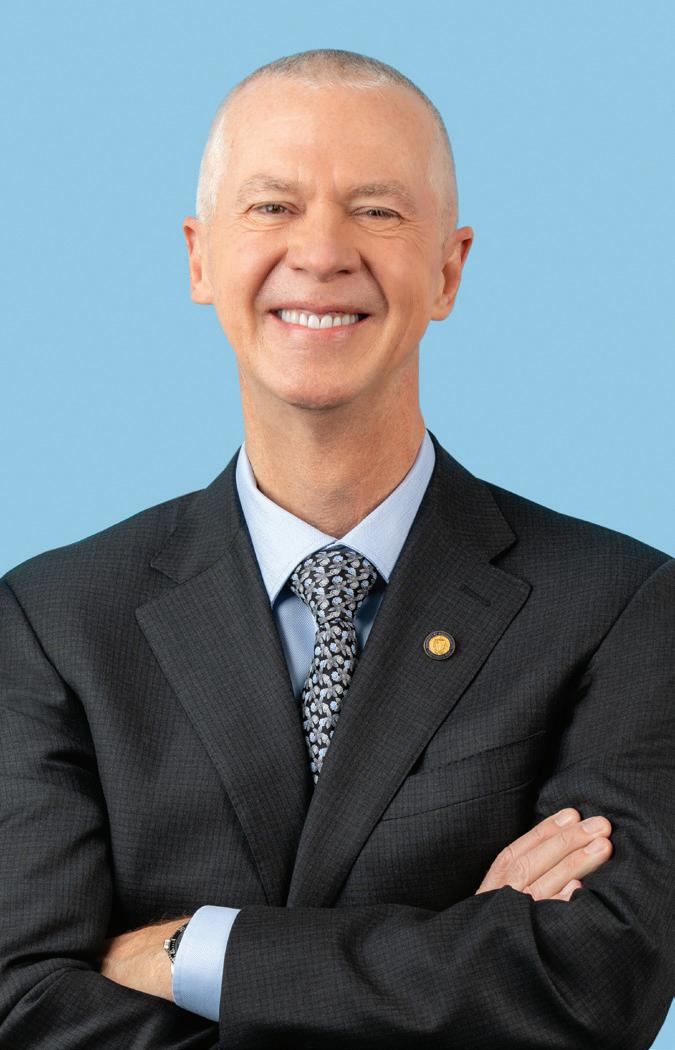
At UMass Dartmouth, our research is creating a brighter future for our students and society extraordinary is what we do
Sincerely,
 Mark A. Fuller, PhD Chancellor
Mark A. Fuller, PhD Chancellor
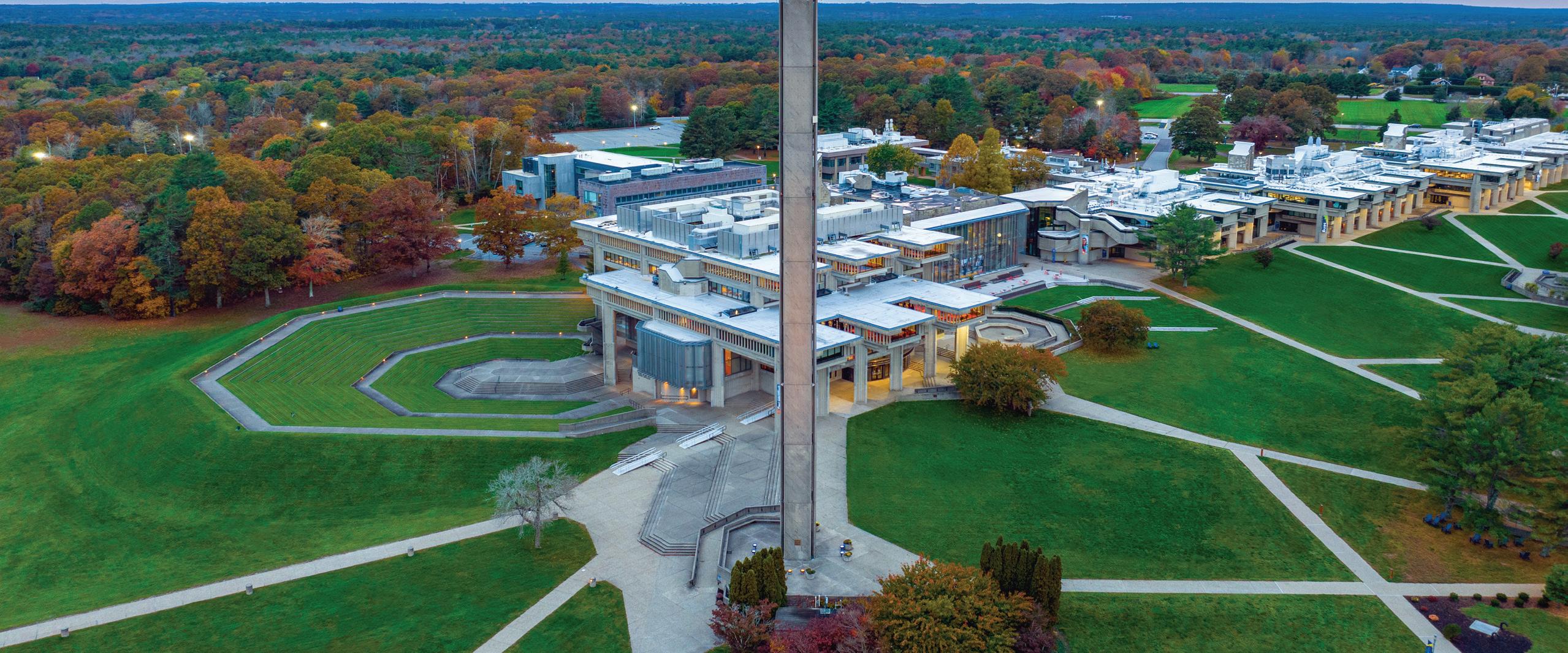
2023 Annual Research Report 3
Marine and UnderSea Technology Research
$3.6M grant for sustained research efforts
UMass Dartmouth received a $3.6 million grant from the Office of Naval Research (ONR) for the Marine and UnderSea Technology research program (MUST), UMass Dartmouth’s collaborative research project with the Naval Undersea Warfare Center Division Newport.

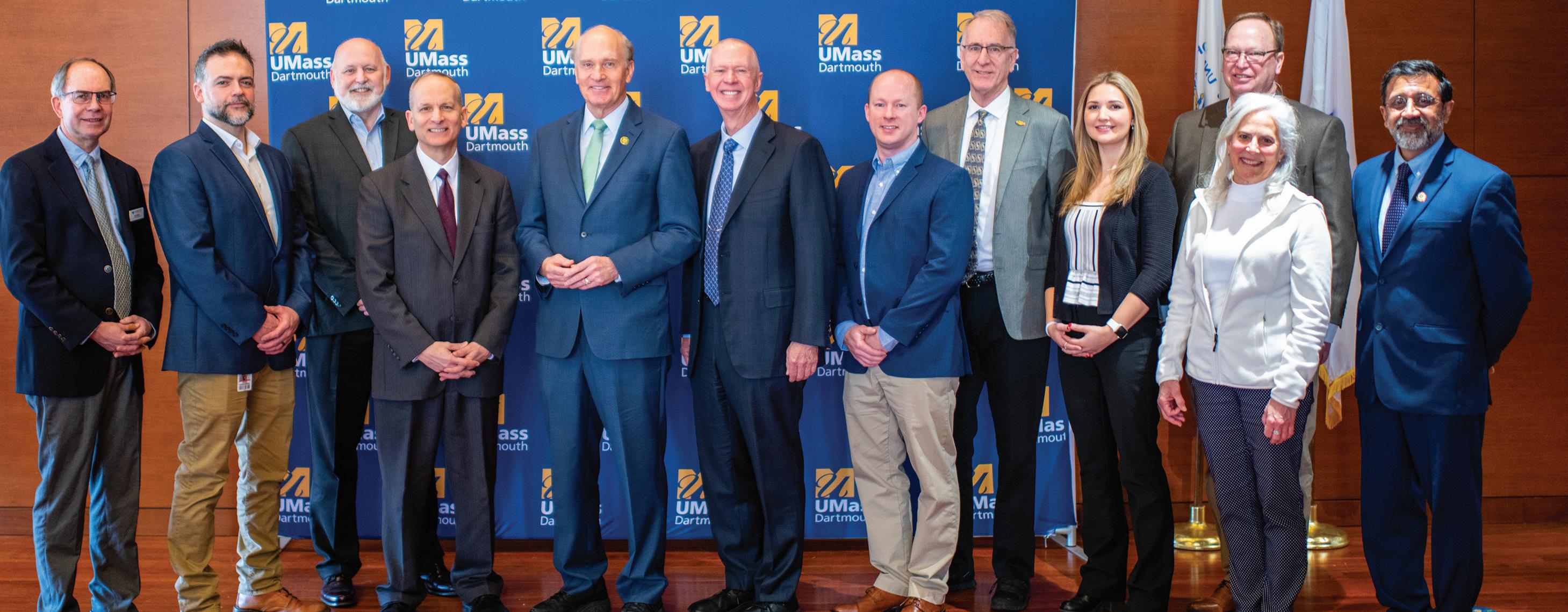
The $3.6M grant will fund nine projects that focus on supporting the blue economy and offshore wind sectors through research projects that focus on improving sensors for unmanned undersea vehicles, wave energy conversion, underwater data transmissions and detection systems, and the habits of marine species in wind farm areas. Partner institutions and industries include BNWC, Brown University, Boston Engineering Cooperation, and Jaia Robotics Inc.
Since October 2020, MUST has received $16.7M from the Office of Naval Research. This most recent award follows a $4.3M grant in February 2022, $4.6M in February 2020, and $4.2M in October 2020. MUST research projects have generated an additional $7.8M in funding from other agencies.
“Southeastern Massachusetts is well-positioned to be the national leader on blue economy projects, and this latest grant from the Office of Naval Research reaffirms what we already know: that UMass Dartmouth is uniquely positioned to lead the region forward as a blue economy hub,” said Congressman Bill Keating. “The cutting-edge research undertaken at UMass Dartmouth will continue to assist the Navy and keep sailors and assets stationed throughout the world safe and on-mission, and that is something our region should be proud of.”
“The marine science and technology research conducted by UMass Dartmouth and our collaborators at the Office of Naval Research and the Naval Undersea Warfare Center in Newport
directly impacts the local economy and has global implications, “ said Chancellor Mark A. Fuller. “Through the research and teaching of our faculty, we are empowering the next generation of blue economy and sustainable energy innovators that will use the power of our waters to achieve remarkable things.”
MUST has funded 38 research projects, bringing together regional and national collaborators to strengthen the Navy’s access to cutting-edge research and build a pipeline for a highly -trained workforce. These areas of study include autonomous underwater vehicles and increasing their battery life, biofouling, composite materials, modeling ocean dynamics, undersea acoustics for communications and sensing technologies,
4 UMass Dartmouth
Research Program (MUST) receives efforts in critical blue economy sectors

Congratulations to UMass Dartmouth for securing this $3.6 million award from the Office of Naval Research to support the Marine and UnderSea Technology research program,” said Senator Elizabeth Warren. “This new award is a testament to the years of groundbreaking research UMass Dartmouth has done to support the blue economy and offshore wind sectors – research that also helps strengthen the U.S. Navy’s mission.”
oxidation mitigation for naval vessels, predictive modeling algorithms, and the use of autonomous vehicles to survey coastal environments.
“The UMass Dartmouth Marine UnderSea Technology (MUST) program is a sterling example of academic research contributing to Blue Economy and National Security objectives as well as producing the next generation of scientists and engineers. The Office of Naval Research is proud to support MUST faculty and students working on cutting-edge undersea science and technology,” said Tom Drake, Director of the Ocean Battlespace Sensing Department at the Office of Naval Research.
“As the public research university for the SouthCoast of Massachusetts, UMass Dartmouth is ensuring Massachusetts is not just the Bay State, but also the Brain State”, said U.S. Senator Edward J. Markey. “The $3.6 million grant from the Office of Naval Research will advance marine science projects and the region’s leadership in the Massachusetts blue economy. This continued federal investment in UMass Dartmouth’s MUST Research Program is a testament to the invaluable partnership between the Navy and the UMass Dartmouth community.”
“Congratulations to UMass Dartmouth for securing this $3.6 million award from the Office of Naval Research to support the Marine and UnderSea Technology research program,” said U.S. Senator Elizabeth Warren. “This new award is a testament to the years of groundbreaking research UMass Dartmouth has done to support the blue economy and offshore wind sectors –research that also helps strengthen the U.S. Navy’s mission.”
MUST focuses on strong industry and higher education partnerships to advance innovation. These partnerships connect top researchers with regional industry leaders’ technological advances and expertise to execute novel solutions for govern-
mental and private industry use. Higher education collaborators include Brown University, Michigan State University, MIT’s Lincoln Lab, Scripps Institute of Oceanography, UMass Amherst, UMass Lowell, University of California Irvine, University of California Santa Barbara, University of Rhode Island, University of Virginia, and Woods Hole Oceanographic Institution. These projects feature dozens of faculty and more than 150 students. Partnerships also include industry partners like Amazon Robotics, BAE, Black and Vea Tech, Boston Engineering Cooperation, Huntington Ingalls Industries, Intellisense Systems, Inc., JAIA Robotics, MIKEL, and Teledyne Marine Systems. Many projects are coordinated through federal research agencies, including Air Force Research Lab, Albert Einstein Institute, NASA, NOAA, NSWC Carderock, and NUWC Newport.
“The Naval Undersea Warfare Center Division Newport values the strong partnerships it has maintained with our higher education institutions. The research they are conducting is essential in developing our next-generation undersea warfare systems. Their work is in no small part helping to ensure we continue to advance the state of the art in undersea warfare.” said Ron Vien, Technical Director at the Naval Undersea Warfare Center Division Newport.
“I am grateful for the Office of Naval Research’s continued support of MUST and our University’s research endeavors,” said Ramprasad Balasubramanian, Vice Chancellor for Research & Innovation and founding Director of the Marine and UnderSea Technology (MUST) research program. “MUST, through its collaborations between faculty at UMass Dartmouth and other researchers outside of the university, has already had an incredible impact on the scientific community. I look forward to our sustained success in marine science and technology.”
2023 Annual Research Report 5
Accelerating cybersecurity education, scholarship, and service
Lance Fiondella
Associate Professor of Electrical and Computer Engineering and Director of the UMassD Cybersecurity Center
$3.5 million grant is the largest financial award UMass Dartmouth has received from the NSF to date
UMass Dartmouth received a $3.5 million grant from the National Science Foundation (NSF) to establish a new CyberCorps® Scholarship for Service program that will provide up to three years of support for students pursuing cybersecurity education. The program aims to address the national demand for a diverse cybersecurity workforce and prepare master’slevel professionals for government cybersecurity positions.
Following graduation, scholarship recipients are required to work in cybersecurity for a federal, state, local, or tribal government organization for the same duration as their scholarship support.
UMass Dartmouth is designated as a National Security Agency and Department of Homeland Security National Center of Academic Excellence in Cyber Defense Education. The project leverages this designation, accelerated BS/MS programs and graduate-level courses in cybersecurity, established partnerships with government agencies, and federally sponsored research efforts to advance scholarship in cybersecurity. This is the largest financial award UMass Dartmouth has received from the NSF to date.
Students might ask, ‘why government?’ Careers in the public sector often provide the opportunity to make a bigger difference.”
- Lance Fiondella

The CyberCorps Scholarship for Service program allows UMass Dartmouth faculty to nurture students’ development not only as learners but as future colleagues in the field. In addition to providing eligible students with scholarship money and stipends, the program will allow students to participate in professional development opportunities including earning industry certifications, presenting at conferences, and attending seminars presented by the field’s leading experts.
This project will help to advance the study of cybersecurity and bolster UMass Dartmouth’s commitment to recruiting and supporting students historically underrepresented in the field of cybersecurity. Scholarship funding will remove financial barriers for students who are academically deserving but financially disadvantaged.
New college graduates don’t always gravitate toward careers in public service. A 2022 study by Qualtrics found that just 44% of recent college graduates said they would consider federal employment. That number is even lower (40%) among minority graduates.
Fiondella also emphasized the urgent need for this program and others like it. “The study of cybersecurity is complex; it intersects with the fields of psychology, human behavioral science, political science, and more. To meet cybersecurity challenges nationally and globally, this kind of investment is needed – more is needed.”
The award was secured through a rigorous peer review and proposal process led by Principal Investigator Lance Fiondella and Co-Principal Investigators Iren Valova, Liudong Xing, Jiawei Yuan, and Gokhan Kul.

6 UMass Dartmouth
Protection & Power in the Digital Age
Operationalizing AI/machine learning for cybersecurity training
Jiawei Yuan
Assistant Professor of Computer and Information Science
$140,000 grant takes holistic technical approach to AI techniques and cybersecurity challenges
Assistant Professor of Computer and Information Science, Jiawei Yuan, PhD was awarded $140,000 for the project, “Collaborative Research: CyberTraining: Pilot: Operationalizing AI/ Machine Learning for Cybersecurity Training,” by the National Science Foundation (NSF).
The interplay between artificial intelligence (AI) and cybersecurity introduces new opportunities and challenges in the cybersecurity of AI, as well as AI for cybersecurity. However, operations and configurations of AI cyberinfrastructure with a security mindset are rarely covered.

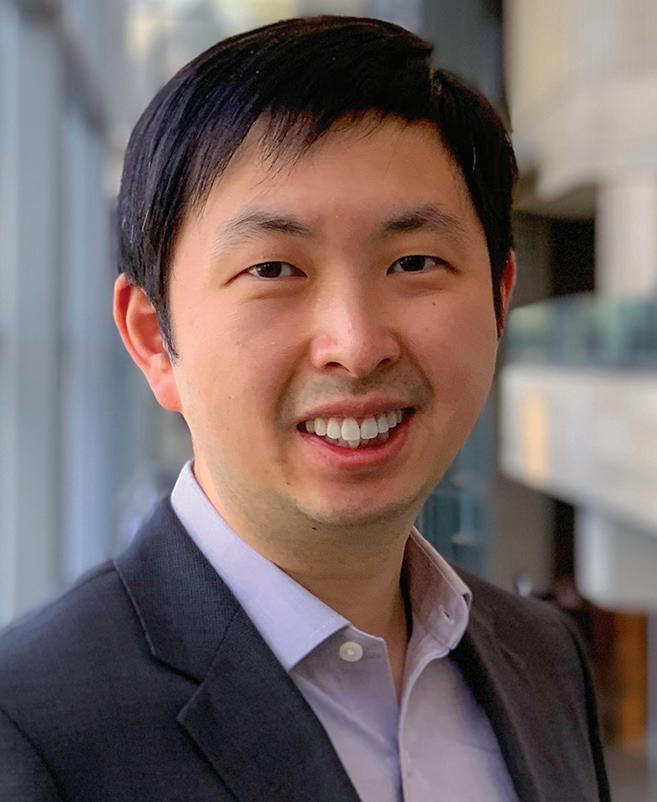
To fill this gap, this project develops a holistic technical approach for cyber training: to identify, apply, and evaluate AI techniques that are inextricably related to well-defined operational cybersecurity challenges. The project intends to develop a Docker -based training platform that simulates and pre-configures a variety of scenarios to support hands-on AI cyberinfrastructure operations in the context of cybersecurity.
The project broadens access and adoption of advanced AI cyberinfrastructure while integrating cyberinfrastructure skills with the security mindset to foster interdisciplinary and inter-institutional research collaborations.
“This project echoes the increasing demand for a research workforce with competencies in operating AI/machine learning cyberinfrastructure with a security mindset and solving research problems to meet national and economic priorities,” said Yuan.
Outcomes from this project will broaden the adoption of AI cyberinfrastructure resources by the scientific community, and thus enhancing the capability of research workforce to use advanced AI cyberinfrastructure to address realistic operational cybersecurity challenges.”
- Jiawei Yuan
2023 Annual Research Report 7
Resilience engineering of machine learning-enabled open world recognition for network intrusion detection systems
Gokhan Kul Assistant Professor of Computer and Information Science
Traditional network security systems, like those based on deep neural networks (DNN), struggle with identifying new types of cyber threats. The U.S. Department of the Army has awarded Assistant Professor of Computer and Information Science Gokhan Kul $149,903 to attempt to solve this by developing a system that can both recognize and explain new attacks. By using machine learning and natural language processing, the system will learn to identify and label these attacks, allowing IT personnel to respond quickly and develop effective defenses in an effort to improve security and protect critical computer systems.

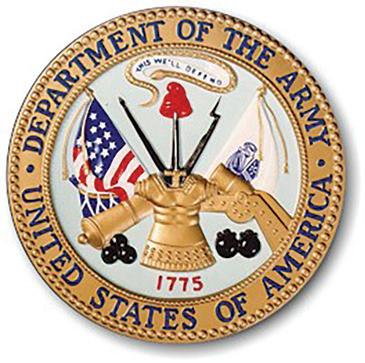

8 UMass Dartmouth
Training the Next Generation of STEM Scholars
UMass Dartmouth faculty are successful in achieving grant funding to support and prepare students for careers in STEM fields. By establishing teaching practices that support citizen science and student engagement, facilitating STEM degrees for community college students, and creating improved learning opportunities in offshore wind and life sciences, our faculty are actively preparing students for industries of the future throughout the Commonwealth and our nation.
MLSC High School Apprenticeship Challenge
2023
Massachusetts Life Science Center (MLSC) provided $72,000 to Tracie Ferreira, associate professor and chairperson of the Department of Bioengineering, to support 20 New Bedford High School students for a six-week paid internship.
Now in its fifth year, the internship program provides students with the opportunity to learn about the biotechnology field and develop skills that will prepare them for a variety of STEM careers. This internship consists of four weeks of training in bioengineering with Dr. Ferreira, one week in medical laboratory science under the direction of Professor and Chairperson of the Medical Laboratory Science program, Frank Scarano, and one week in chemistry under the direction of Associate Professor and Chairperson of the Department of Chemistry and Biochemistry David Manke.
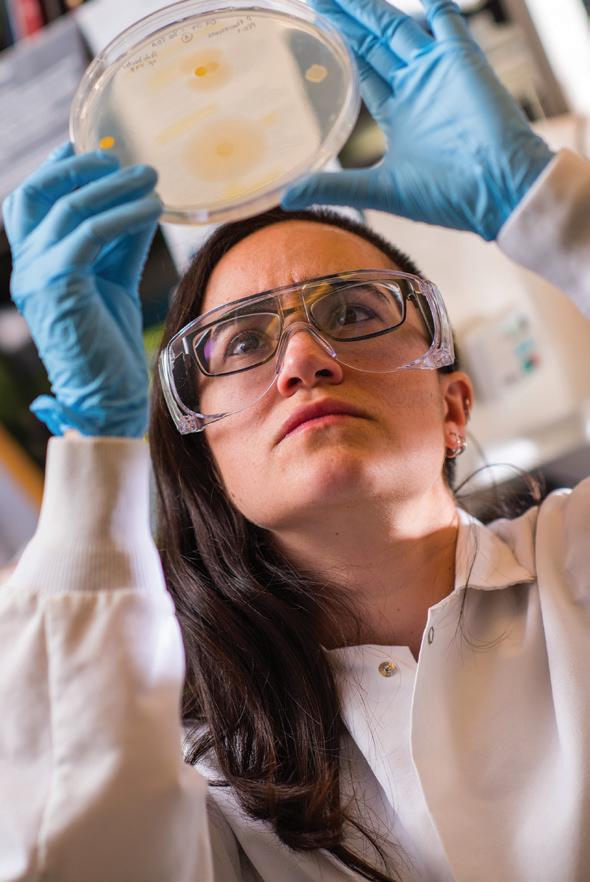




2023 Annual Research Report 9
Tracie Ferreira
Associate Professor and Chairperson of the Department of Bioengineering
Ming Shao receives $498K CAREER award from National Science Foundation
Ming Shao
Assistant Professor of Computer and Information Science

Dr. Ming Shao, assistant professor of computer and information science, received a $498,970 National Science Foundation (NSF) CAREER award for his project “CAREER: Enabling Continual Multi-View Representation Learning: An Adversarial Perspective.” The CAREER Program is the NSF’s most prestigious award in support of early-career faculty who have the potential to serve as academic role models in research and education.
“Representation learning techniques attempt to extract and abstract key information (i.e., the features) from raw data to be used in analyses in a wide range of applications. As a critical step in machine learning systems, representation learning is meant to be robust in its capacity, regardless of the mutation of raw data due to noises or the variations of raw data caused by capture devices,” said Shao. “In the era of big data, representation learning techniques are confronted with new challenges. Massive data collected from different sensors (e.g., the multi-view camera system) or presented in different modalities (e.g., audio-visual-text) have overloaded existing representation learning techniques.”
This project will develop a robust continual representation-learning model to address these challenges. In real-world scenarios where data access is restricted (e.g., sensitive data) or the processing power of devices is limited (e.g., edge and mobile devices), stakeholders will benefit from the adaptive representation learning techniques to enable continual data analyses. The research outcomes will be leveraged to promote STEM education for K-12 students and education activities at UMass Dartmouth.
I am grateful to receive this award to support my research in representation learning, student mentorship, and educational activities at UMass Dartmouth, and promote research collaborations and civic engagement in the SouthCoast of Massachusetts.”
- Ming Shao
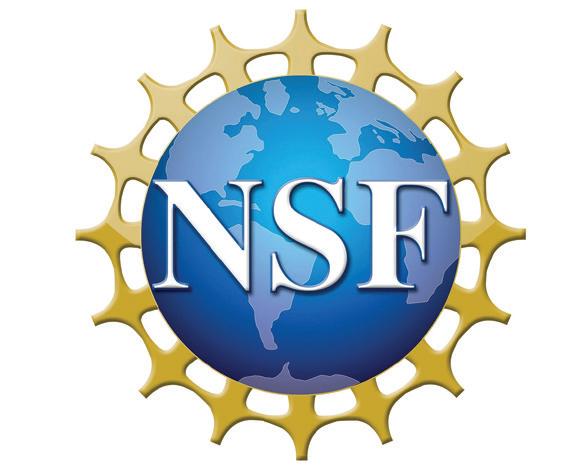
10 UMass Dartmouth
Connecting Undergraduates to Biodiversity Instruction through Citizen Science (CUBICS)
Stephen Witzig Associate Professor STEM Education & Teacher Development

The CUBICS Project, funded by a nearly $600,000 grant from the National Science Foundation, aims to serve the national interest by establishing teaching practices that support active engagement with real-world scientific research to increase student retention in the sciences.
Community participation in formal scientific research, or citizen science, has tremendous potential to be a transformative social innovation for undergraduate science education and learning. Students engaged with citizen science projects are active partners in their learning, as they gain a deeper understanding of the importance of science to the community and increase the likelihood of a career path in the sciences.
One obstacle to fully engaging undergraduate students in citizen science is the translation of faculty’s scientific expertise into classroom activities.

To remove this obstacle, a community of faculty among diverse institutions in SouthCoast Massachusetts will work together to develop citizen science projects through a socioscientific issues-based instructional approach, monitor how they execute their projects, and assess the impacts on their students.
The first summer institute was held last July with participating faculty from eight higher education institutions in MA and RI. A second institute will be held in the summer of 2024.
We anticipate that our community of faculty will become agents of change in their own institutions, sharing new pedagogy with peers, and agents of change in the region, connecting students to science and to nature in powerful ways through the use of citizen science.”
- Stephen Witzig
2023 Annual Research Report 11
STEM Starter Academy: 2- to 4-Year Summer STEM Transfer Academy
Jennifer Murphy Assistant Dean, College of Engineering
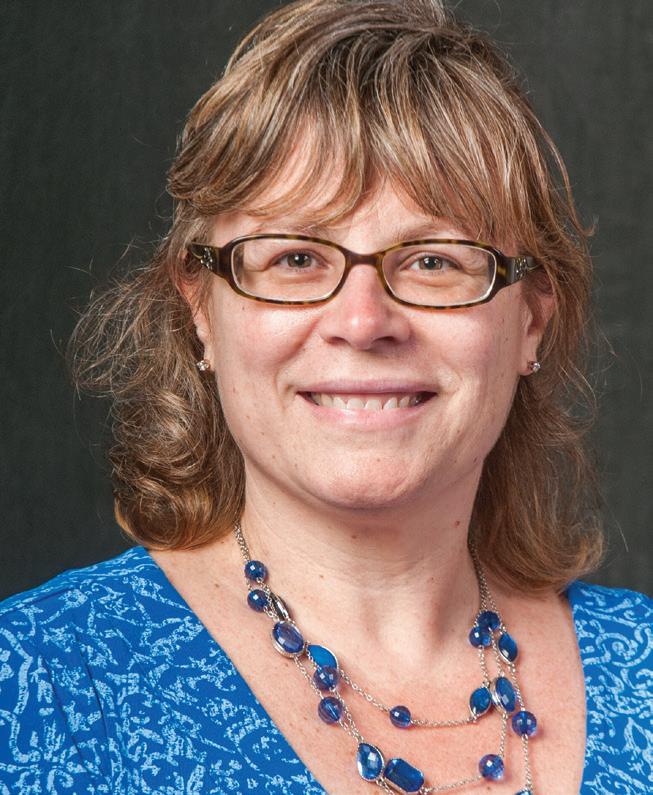
The Summer STEM Transfer Academy is designed for community college students interested in STEM careers and is a collaborative effort between Bristol, Massasoit, and Cape Cod community colleges, and UMass Dartmouth. The goal is to increase the number of STEM degrees and certificates earned by community college students.
This program, held for the fifth year this summer, was funded by a $28,121 grant from Bristol Community College and is led by College of Engineering Assistant Dean Jennifer Murphy. Students intending to transfer to UMass Dartmouth are engaged in activities and coursework, are exposed to college life at the university level, and earn college credits. This allows for a smooth and seamless transition from a two-year institution to a four-year college or university to continue their STEM studies.
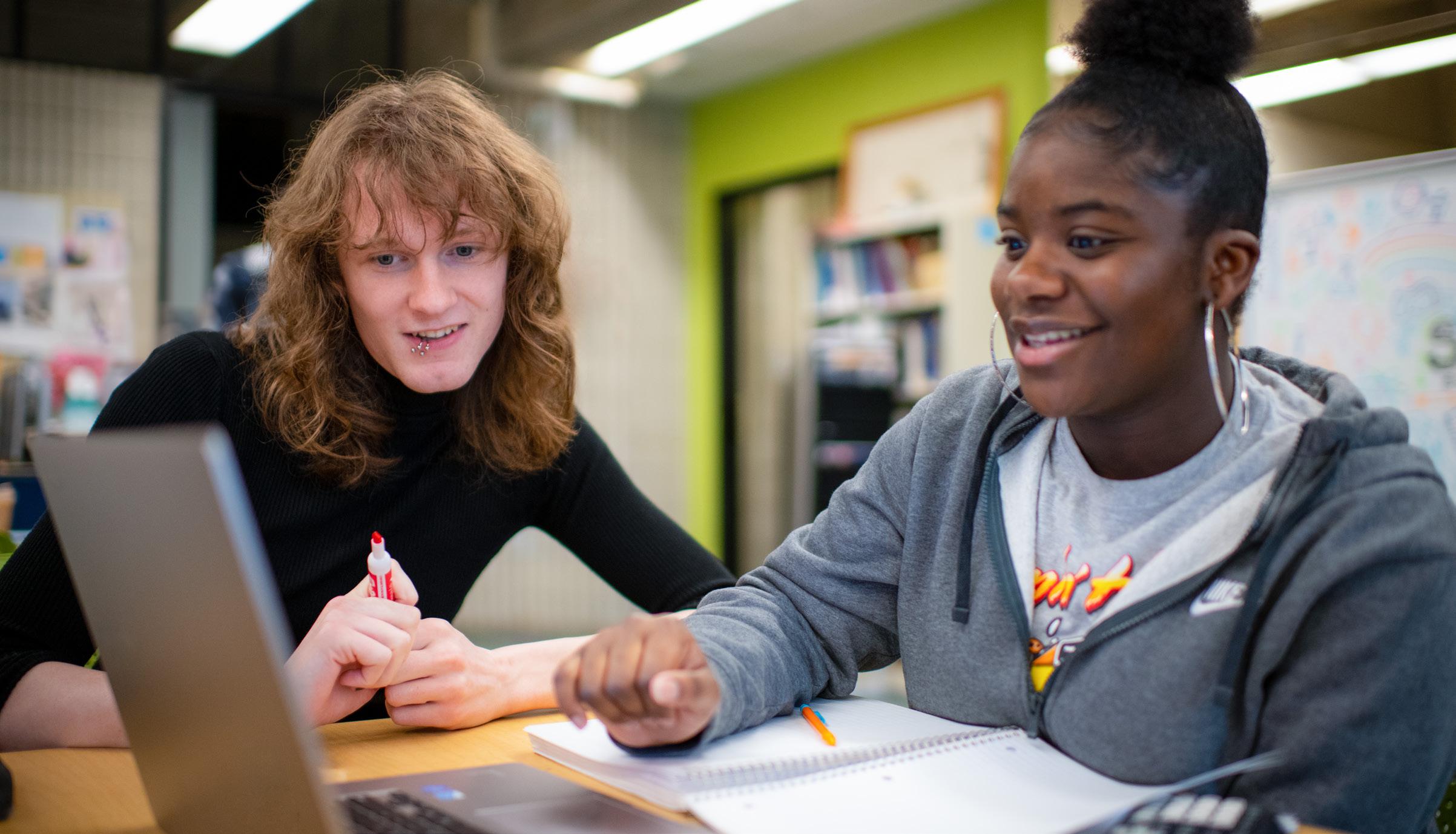
12 UMass Dartmouth
Closing the experience gap
Daniel MacDonald
Professor and Co-Chair of Civil & Environmental Engineering and Professor of Estuarine & Ocean Sciences
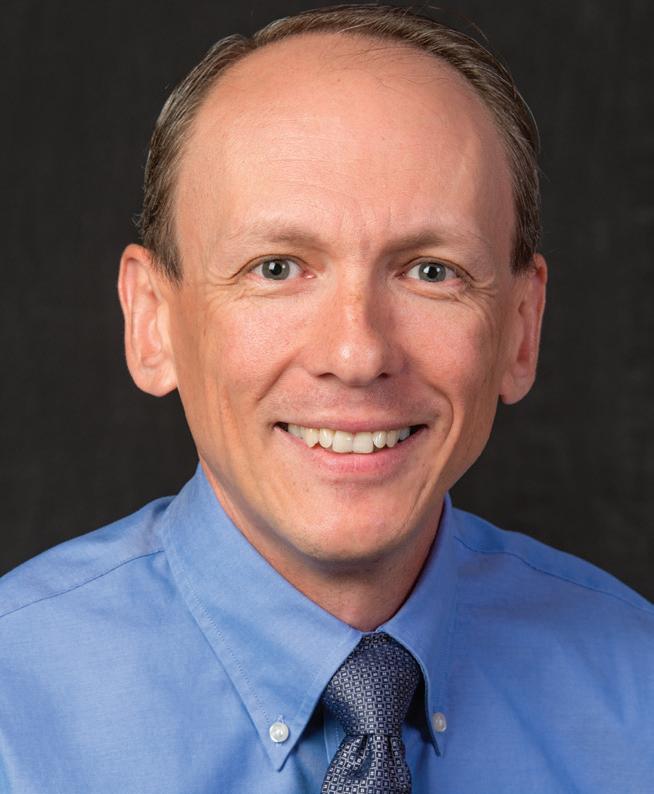

UMass Dartmouth was awarded a $373,048 grant by the Massachusetts Clean Energy Center and $375,000 in matching dollars from partners BankFive, BayCoast Bank, and Bristol County Savings Bank to offer careerrelevant paid internship and experiential learning opportunities to students in offshore wind through this program.
“Closing the experience gap” offers opportunities to more than 120 students from UMass Dartmouth and Bristol Community College to help accelerate a talent pipeline for the fast-growing offshore wind industry. Led by Civil and Environmental Engineering and Estuarine & Ocean Sciences Professor Dan MacDonald, this initiative is designed to supplement existing workforce training and degree and certificate options at both institutions.

2023 Annual Research Report 13
Stepping Stones: Achieving greater diversity in life sciences through laboratory science
Frank Scarano Professor and Chair of the Medical Laboratory Science Program
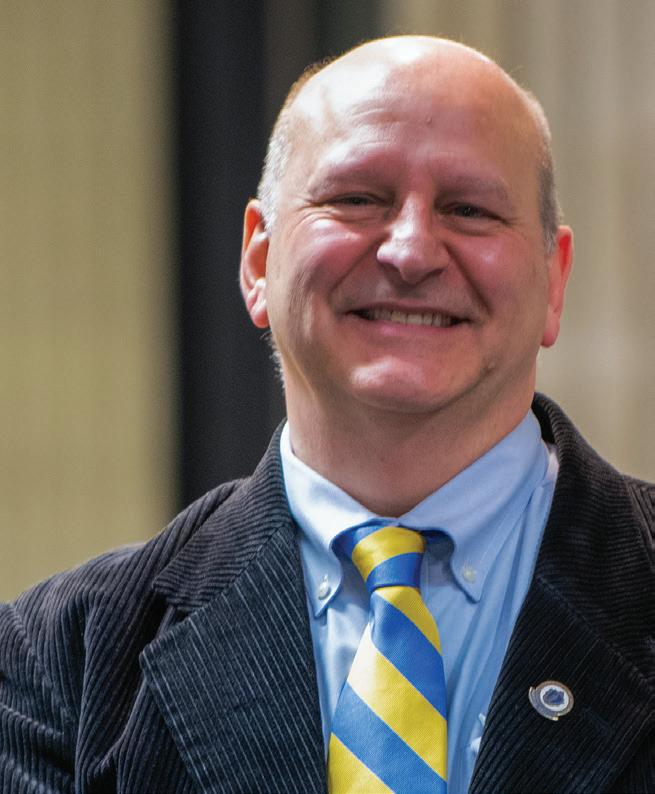
“Stepping Stones: Achieving greater diversity in life sciences through laboratory science” demonstrates UMass Dartmouth’s and the Massachusetts Life Sciences Center’s (MLSC) shared commitment to increase diversity in the life sciences.
A $750,000 grant from MLSC has added advanced technologies to the university’s Medical Laboratory Science (MLS) spaces, including microbiology testing stations, blood testing equipment, and cell manipulation hardware. Students in the program will utilize these new pieces of equipment and methodologies that are the same ones as employers use in Massachusetts’s burgeoning life sciences sector.
The College of Nursing & Health Sciences recently celebrated the equipment upgrades that will prepare MLS students for in-demand careers in the life sciences in our region and beyond.
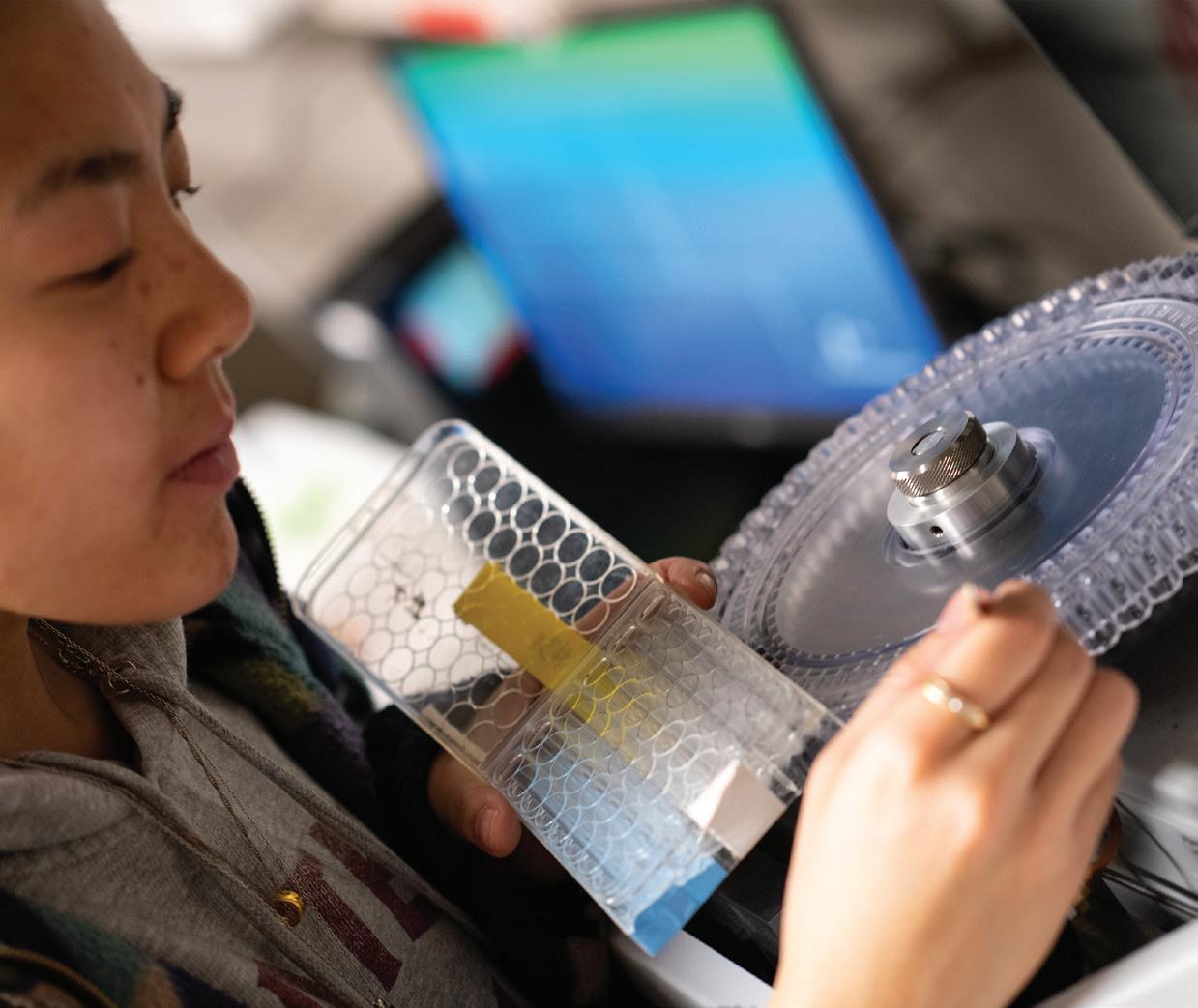
We are incredibly grateful to Massachusetts Life Sciences Center for their support of Stepping Stones. The demand for skilled laboratory scientists in both the life sciences and health sciences continues to grow, and our highly-motivated, hard-working, diverse students need to learn on the same equipment used in modern labs.”
- Frank Scarano

14 UMass Dartmouth
INTeRnal waves In angular momeNtum StratifICation (INTRINSIC)
Amit Tandon Professor of Mechanical Engineering and Estuarine & Ocean Sciences

Assistant Research Professor Christian E. Buckingham (PI) and Professor Amit Tandon (Co-investigator) have been awarded $480,694 from the National Science Foundation (NSF) for the project, “INTeRnal waves In angular momeNtum StratifICation (INTRINSIC).”
An important discovery in the oceanography community has been the realization that centripetal accelerations, or curvature, can modify the stability of fluid parcels within fronts. A portion of this curvature effect is derived from changes in the potential vorticity of the fluid, while another arises from absolute angular momentum—two quantities that are approximately conserved at small horizontal scales in the oceans. Moreover, curvature can be shown to locally modify the frequency, dispersion, and hence propagation of internal waves (IWs). Owing to where such waves lose energy or break, this can have a significant impact on energy, buoyancy, and tracer fluxes between the ocean and atmosphere.
INTRINSIC aims to study this topic by systematically examining a simplified model of a curved front, together with numerical simulations of the same, in order to better understand the dispersion, propagation, and fate of IWs within the ocean. In particular, the project seeks to determine if IW energy is elevated or diminished within fine-scale fronts as a result of curvature. The proposed research will make use of a hierarchy of numerical models, whereby analytical and idealized numerical models are used to inform and facilitate analysis of realistic simulations.
“I am extremely grateful to the NSF for recognizing the fundamental nature of this research and its potential to improve, not only our understanding of the oceans, but Earth system models, as well,” said Buckingham. “This is also a recognition of the quality of work that is performed at the University and the School for Marine Science and Technology (SMAST). Professor Tandon, together with his students & postdocs at UMassD, have been at the forefront of research in upper ocean physics for many years and I am delighted to contribute to this effort.”
The project will harness significant advances in computational capabilities at the UMassD Center for Scientific Computing & Data Science Research (CSCDR) and a regional HighPerformance Computing (HPC) cluster and will additionally impact the academic community through (1) training and mentorship of undergraduates involved in the project and (2) development of a web-based educational tool specific to upper ocean dynamics.
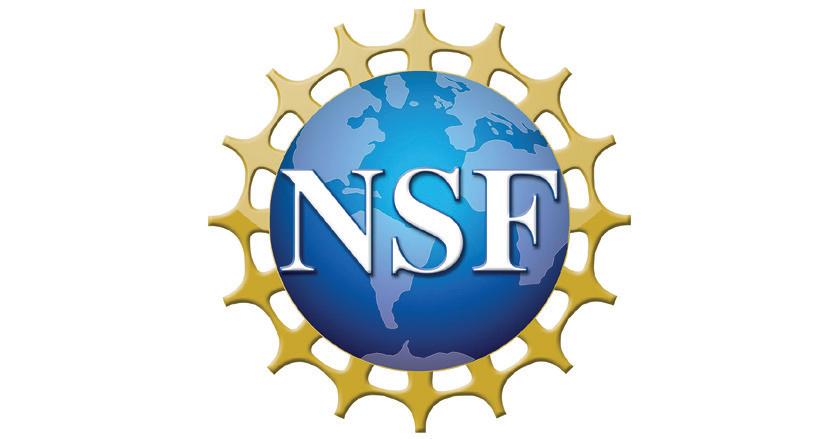
2023 Annual Research Report 15
Christian E. Buckingham (PI) Assistant Research Professor
Using Science & Technology to Explore our
Oceans
Amit Tandon
Kevin Stokesbury awarded $3.56M in research funding focused on East Coast fisheries
Kevin D.E. Stokesbury
Dean of the School for Marine Science and Technology and Commonwealth Professor
Sea Scallops
Stokesbury was awarded four grants totaling $1.4 million for sea scallop research through the National Oceanic and Atmospheric Administration (NOAA) Fisheries Scallop Research Set-Aside (RSA) Program. Co-principal investigators from the School for Marine Science and Technology (SMAST) include post-doctoral research fellow Adam Delargy and research associate Amber Lisi.
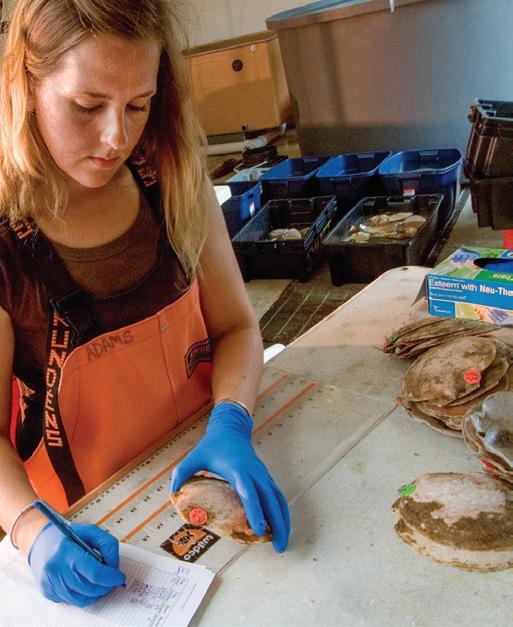
In RSA programs, researchers apply for funding through a competitive federal grant process managed by NOAA Fisheries. No federal funds are provided to support the research; instead, funds generated from the sale of sea scallops are “set-aside” annually for this purpose. Selected researchers partner with the fishing industry to conduct research and to harvest their set-aside award.

All four of Stokesbury’s most recent RSA projects build upon the image-based drop camera survey he created in collaboration with the scallop fishing industry in 1999. This noninvasive survey captures images of the sea floor, providing fishery resource managers, marine scientists and fishing communities with much-needed data on sea scallops and their habitat. Over the last two decades, Stokesbury’s research has proven crucial to the revival of the scallop fishing industry.
“These latest RSA projects represent a continuation of ongoing work performed by more than 30 master’s and PhD students here at SMAST, and in collaboration with scallop fisheries and resources managers,” Stokesbury says. “The data we gather will allow us to better understand sea scallop resources and conditions in these areas and help set management regulations for the following year.”

Offshore Wind
Stokesbury and co-investigator Professor Pingguo He were awarded $1.2 million from Vineyard Offshore to evaluate the potential impact of the development and subsequent operation of America’s first commercial-scale offshore wind farm, Vineyard Wind 1, on fisheries in the short and long terms.
Located 15 miles from Martha’s Vineyard, the 800-megawatt, 62-turbine wind farm will start to generate power by the end of the year. Starting in 2019, SMAST researchers have conducted fisheries surveys in the area to provide needed data for before-and-after analysis of the potential impact. Stokesbury’s group will conduct drop camera surveys ($269K) and ventless trap and plankton surveys ($254K), and He’s group will conduct trawl surveys ($691K). Drop camera surveys will provide data for assessing benthic megafauna while plankton surveys will assess plankton and fish and lobster larvae near the surface. The lobster trap survey will assess lobster population in the area. Trawl surveys will collect data over a variety of organisms of fish and shellfish to provide data for biomass estimate of species not covered by other surveys. The survey will be conducted four times a year covering different seasons, and in the development area and an adjacent control area. Researchers expect to continue similar work for another three years after the wind farm is in full operation in 2025, to provide adequate data for a before-and-after analysis of the potential impact of the wind farm.
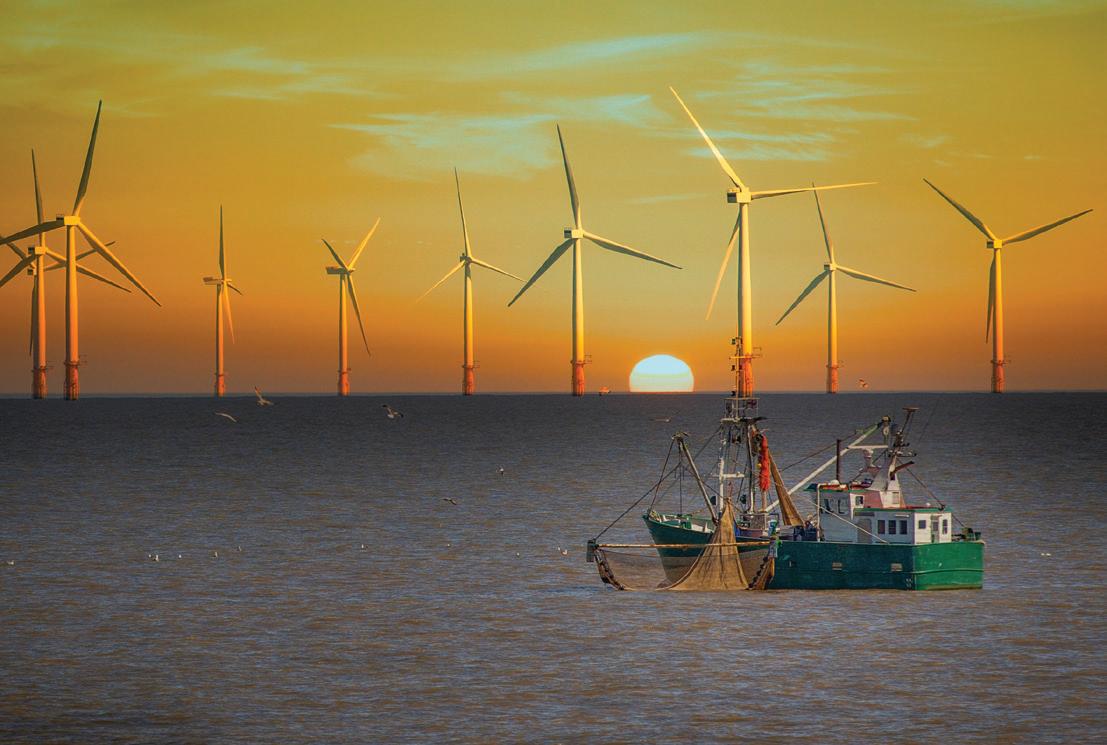
16 UMass Dartmouth
Prototype
management strategy evaluation for Georges Bank ecosystem-based fishery management
Professor Gavin Fay was awarded $159,189 by the New England Fishery Management Council. The project will build upon two existing modeling frameworks to develop a prototype Management Strategy Evaluation (pMSE) framework. This pMSE framework will be used to evaluate the performance of different ecosystem-based fisheries management (EBFM) options, including the ceilings and floors approach. The project involves limited technical analyses and focuses on
stakeholder engagement and education. Objectives include replicating the full MSE process in a short time frame, developing a linked MSE modeling platform, representing alternatives for EBFM procedures, comparing the performance of alternatives, mapping decision points, and evaluating the performance of tested alternative management procedures.
Exploring the connectivity among offshore wind turbines
Pingguo He
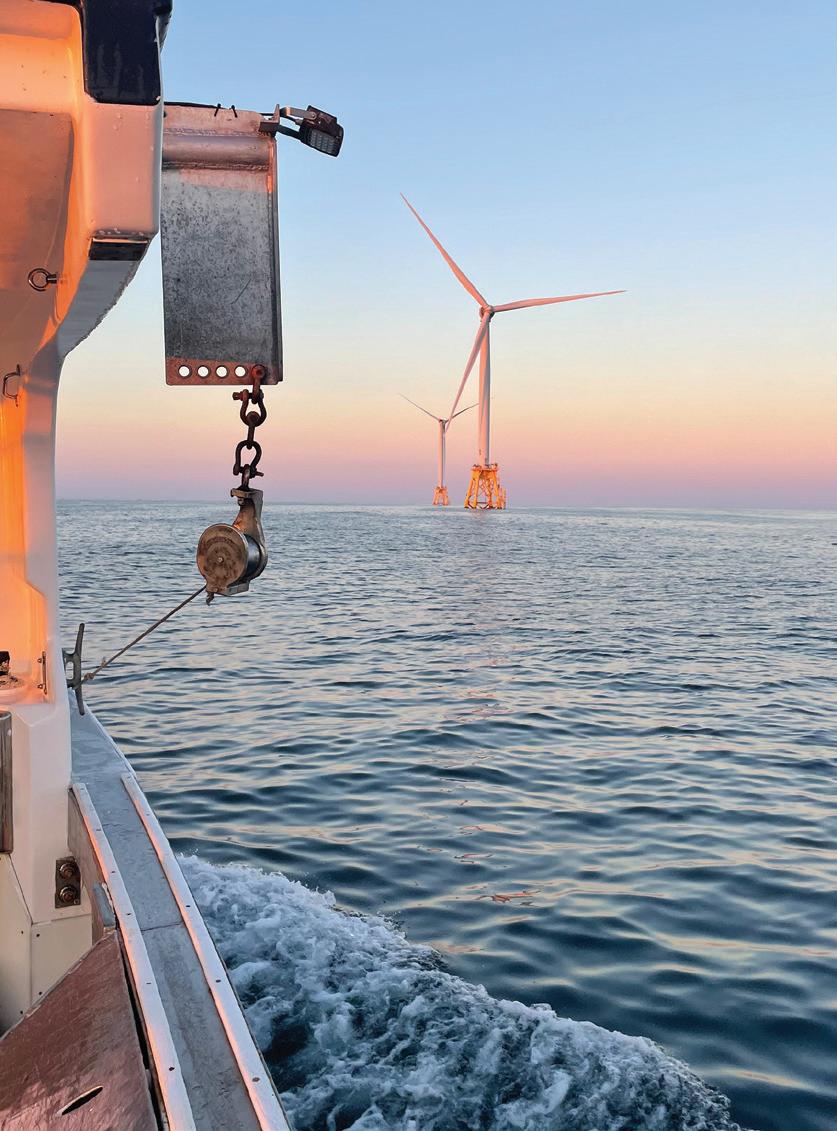
Professor and Chairperson, Fisheries Oceanography

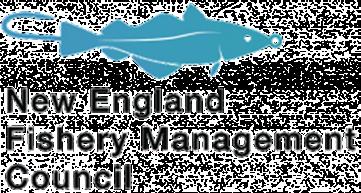

Professor Pingguo He and Professor Steve Cadrin were awarded $396K from the Bureau of Ocean Energy Management (BOEM) to evaluate the impact of offshore wind turbines on marine ecosystems and fisheries at the Block Island Wind Farm off the coast of Rhode Island. Specifically, researchers will observe fish behavior and determine if there is an additive effect on fish from multiple structures (turbines).
“This is a pioneering project that combines acoustic tagging, and optimal and acoustic imaging to understand fish movement, spatial distribution and residency in a U.S. offshore wind farm in different seasons and over multiple years. The results may have profound influence on our understanding of interactions between region’s fish and wind turbines,” said Professor Pingguo He.
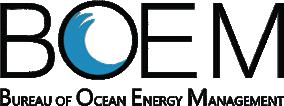
2023 Annual Research Report 17
Gavin Fay
Associate Professor of Fisheries Oceanography
Photo: Allison Frey, graduate student at SMAST
Advancing atmosphere-land-ocean model coupling technology to improve coastal inundation forecasts
Changsheng Chen
Commonwealth Professor & Montgomery Charter Chair, Fisheries Oceanography
Professor Changsheng Chen received $200,000 from the Northeastern Regional Association of Coastal Ocean Observing Systems for his project, “Advancing Atmosphere-Land-Ocean Model Coupling Technology to Improve Coastal Inundation Forecasts.” The total amount to be awarded for this project over the course of five years is $1 million.
Coastal inundation along the U.S. Northeast coast is defined as flooding caused generally by hurricanes (tropical cyclones) and extratropical cyclones. The combined wind waves and storm surges during high tide can produce significant inundation and severe damage in the coastal zone. Chen’s research will contribute to the development of advanced technology to improve our ability to forecast coastal inundation.


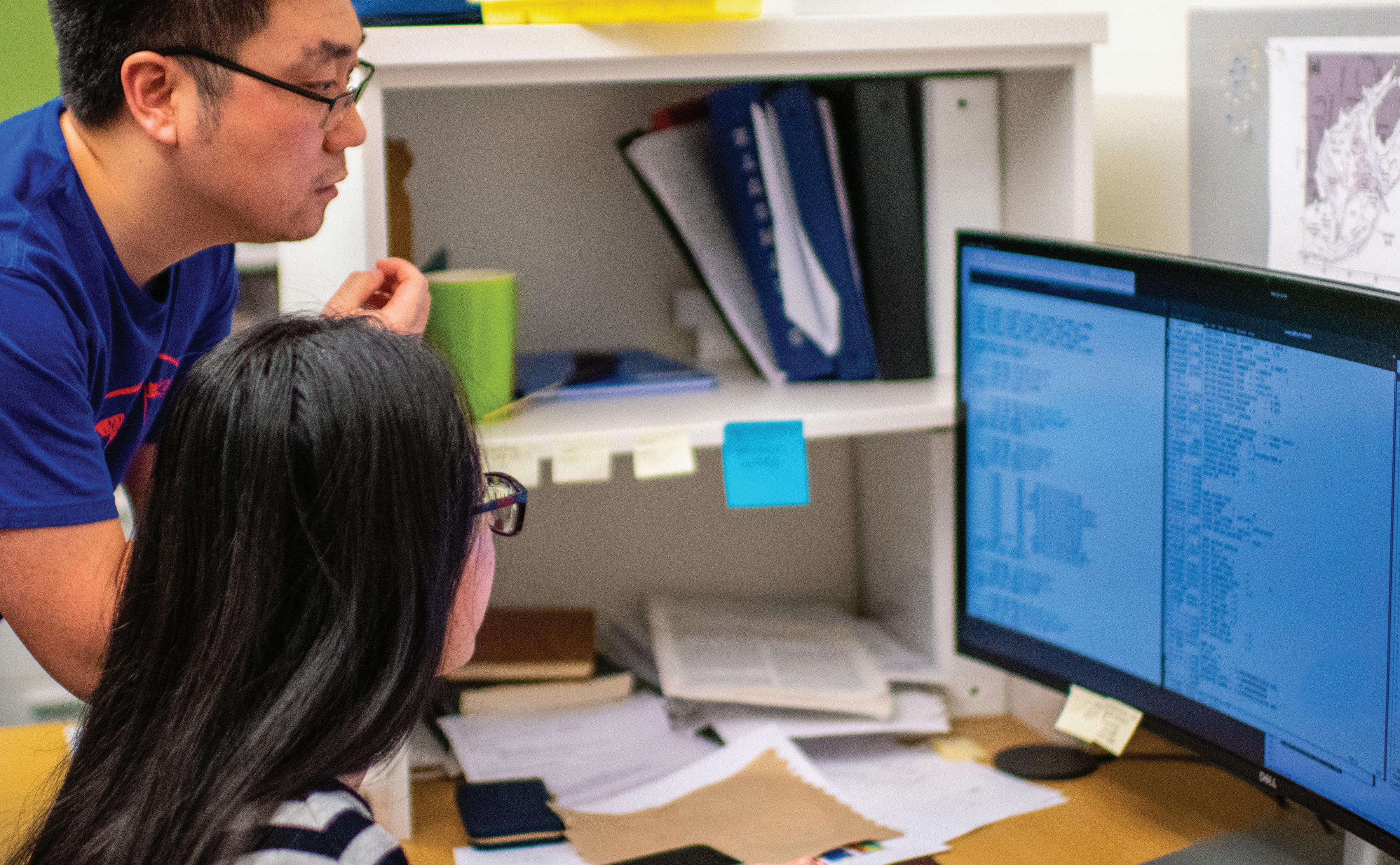
18 UMass Dartmouth
Reduced basis enhancements of neural networks and their application to quantum materials simulation
Yanlai Chen Professor of Mathematics
Award marks Chen’s fifth NSF grant, and third along the topic of research on the reduced basis method
Professor Yanlai Chen (PI) and Chancellor Professor Sigal Gottlieb (Co-PI) were awarded $296,555 for the project, “Reduced Basis Enhancements of Neural Networks and Their Application to Quantum Materials Simulation,” by the National Science Foundation (NSF).
The need to understand the configuration-to-performance map of a system efficiently and accurately under various configurations is ubiquitous, yet challenging, due to the prohibitively high computational cost. This project aims to closely integrate two techniques to tackle this challenge by building analysis-driven computational emulators for these systems.
The first technique is the more traditional and mathematically rigorous reduced basis method, and the other explores more nascent deep neural networks. The resulting emulators learn the system behavior reliably and are expected to perform better than the current approaches on data unseen during training.
As an application of the developed methodology, this project aims to provide a systematic and rigorous study of parameterized 2D materials simulation, including the recently discovered magical angle twisted bilayer graphene.
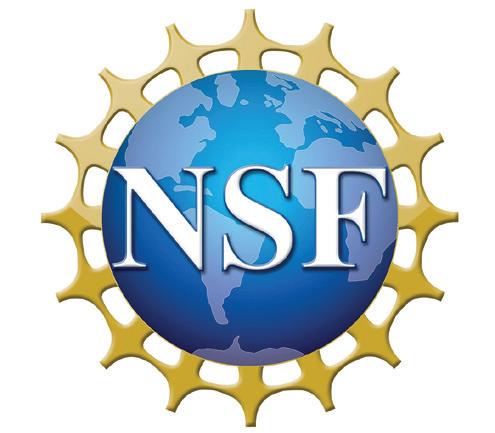
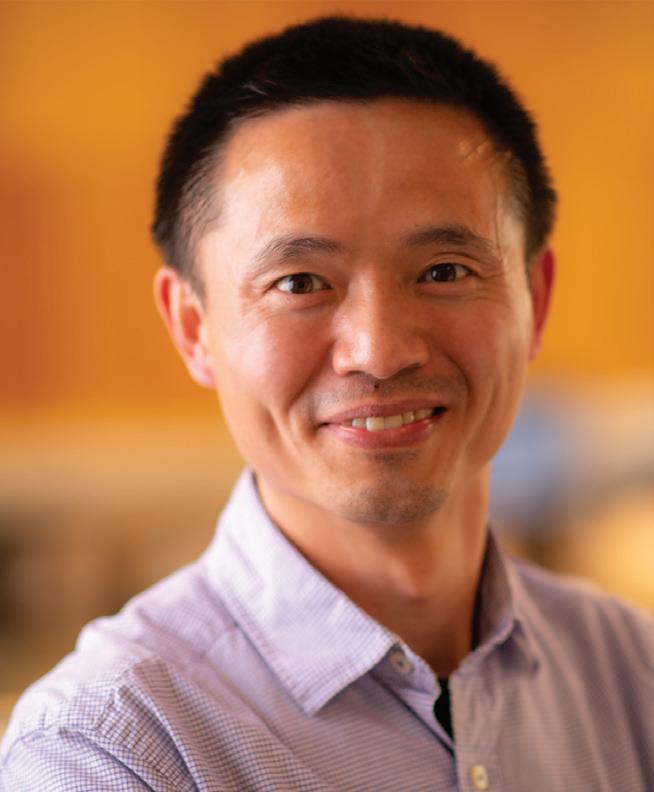
“I am grateful to the NSF for recognizing our vision, the great research our team of faculty and students have been conducting at UMass Dartmouth, and its further potential,” said Chen.
The project involves the development of graduate coursework for the engineering and applied science program and the training of undergraduate and graduate students through involvement in the research.”
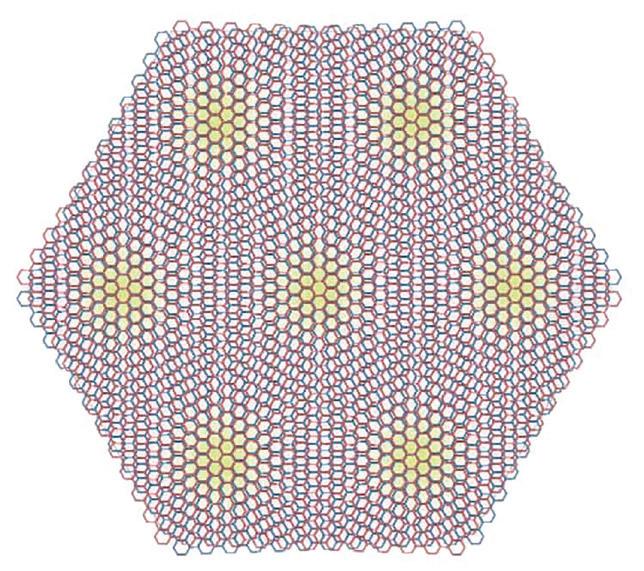
The outcomes of this project are expected to benefit the greater scientific community that utilizes supervised machine learning for parameterized models.”
- Yanlai Chen
2023 Annual Research Report 19
Solving and eradicating HIV-1
Xiaofei Jia
Associate Professor of Chemistry and Biochemistry
Biochemistry professor wins two NIH R01 grants in two months combining for a first-year budget of over $1.2 million
Associate Professor of Chemistry and Biochemistry Xiaofei Jia, PhD was awarded two NIH-funded R01 grants this summer with first-year budgets combining for over $1.2 million. The first is a five-year grant for, “Elucidating the Structural Bases of HIV-1-Induced CD4 Degradation,” with a first-year budget of $531,301.
A month following, his lab was also awarded a four-year grant for, “Developing Cyclopeptide Nef Inhibitors to Facilitate HIV-1 Eradication.” This project was originally awarded a one-year R56 grant in August 2022, and was extended after Jia’s lab showed promising work.
“This is very exciting for my lab,” said Jia. “Our research has two components, and the two new grants each provide multi-year support for one component of our work. The first component of our research involves using structural biology to understand how HIV-1 evades the immune system. The first grant will help us further understand structurally how the virus utilizes multiple strategies to take down an important host immune receptor, named ‘CD4.’
“Once we understand through our structural work how certain immune evasion is achieved by the virus, we may then be able to engage with the second component of our research –developing therapeutics to target and possibly clear the viral infection.
“The second grant supports our efforts here. In this project, we’re working on developing cyclopeptide-based therapeutics, a novel type of drug with immense potential.
“Receiving funding for both components of our research means that we can continue to keep things balanced, which is great in many senses, including for student training.”
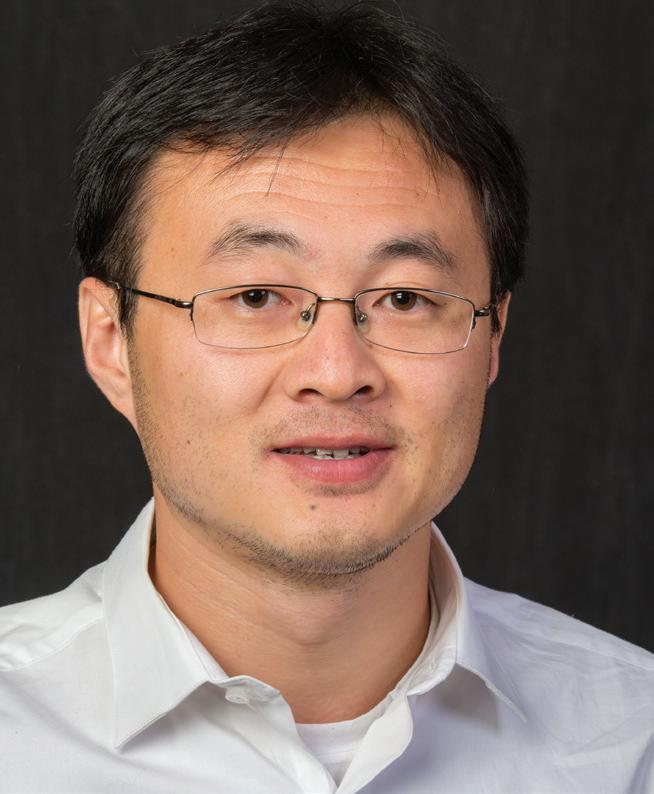
While currently available antiretrovirals can control HIV infection, they cannot eliminate it, which means that there is still no cure for this disease. Part of the difficulty in finding a cure for HIV is that the virus has devised mechanisms to hide the infection from the host immune system. The work in the Jia Lab explores one possible route to finding a cure.
“Drug discovery is high-risk, high-reward,” said Jia. “Brilliant ideas fail most of the time, but there’s no way to know without trying it. We believe that this direction should be explored experimentally and we’re very grateful that the NIH recognizes the value of our work and is supporting our efforts with these multi-year grants.”
The cyclopeptide project is pursued collaboratively by three research groups: Dr. Rudi Fasan’s at the University of Texas at Dallas, Dr. John Guatelli’s at the University of California San Diego, and our group here at UMass Dartmouth, which will serve as the primary and contact site.
“As a team, we first applied for this grant a year prior. However, we had a challenging time convincing the reviewers of its practicality,” said Jia. “The NIH program officer, recognizing the potential of our project, issued us a one-year R56 grant so that we could gather more data to further validate our approach. The support of the R56 interim grant was tremendous in maintaining this large collaboration.”
The National Institutes of Health is the largest public funder of biomedical research around the globe. Their support has led to life-saving treatments and an ever-growing body of research that paves the way for future breakthroughs. The Research Project Grant (R01) is the original and historically oldest grant mechanism used by NIH, providing support for healthrelated research and development based on the mission of the NIH.
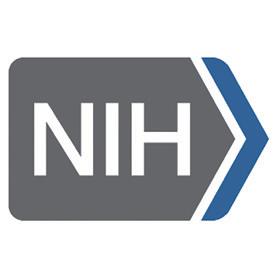
20 UMass Dartmouth
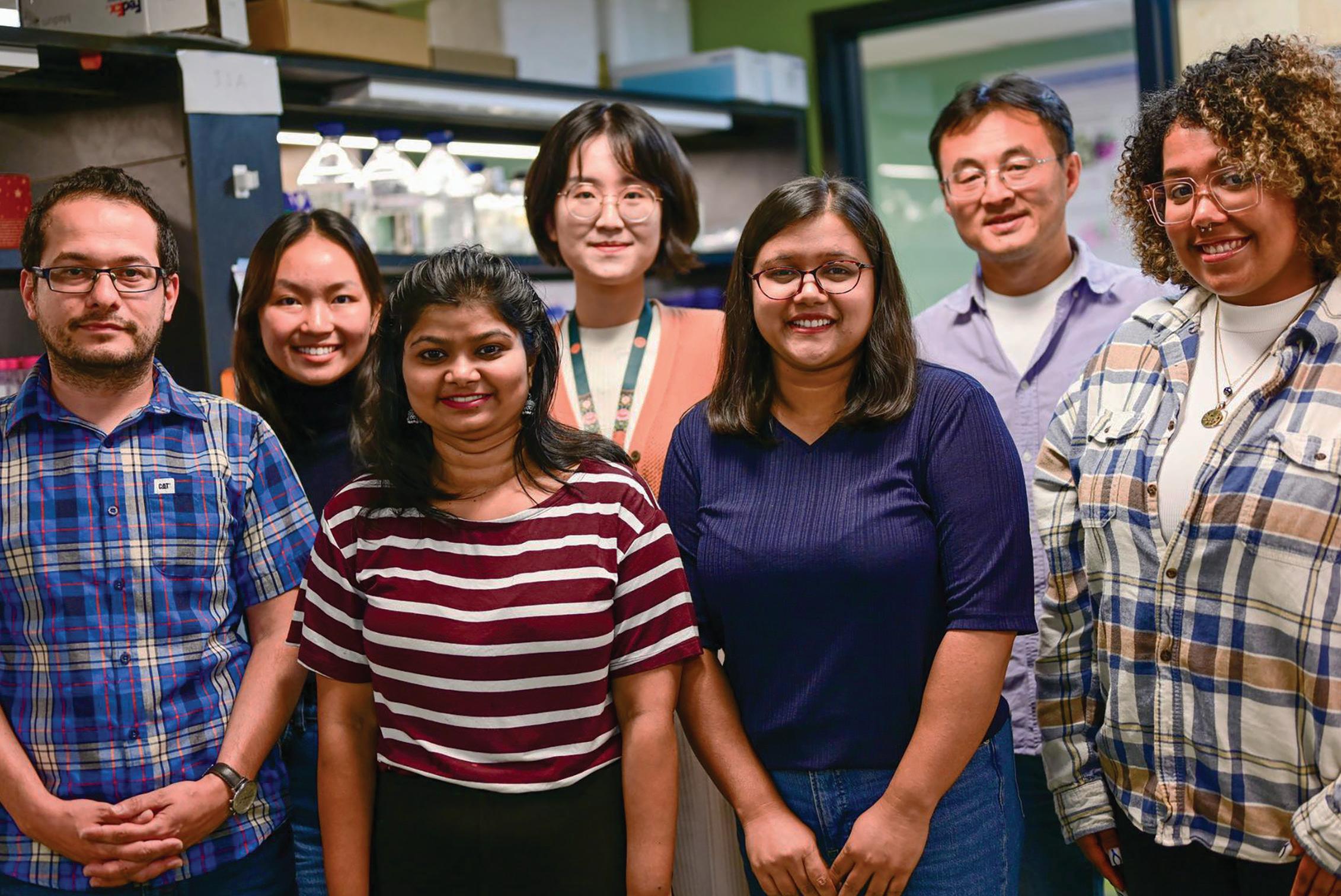
Jia Lab members at all levels— PhD, master’s, and undergraduate—are contributing to these projects. PhD students Jacob Kress, Mohammad Karimian Shamsabadi, Priya Sridharan, Kequan Wang, BS/MS students Dodhy Saint-Amand, Ruth Barbosa Amado, and junior Linh Dan Nguyen have contributed to and/or are working on the structural biology project; PhD students Mohammad Karimian Shamsabadi, Fatema Yeasmin, and Kequan Wang have contributed to and are continuing to work on the cyclopeptide inhibitor development project.
“As an undergraduate, I feel very lucky to be as close as I am to the primary investigator on such an impactful project, and to get so much exposure to different laboratory techniques,” said junior biochemistry student Linh Dan Nguyen ‘25. “I don’t know that I would have had these opportunities at a larger university.”
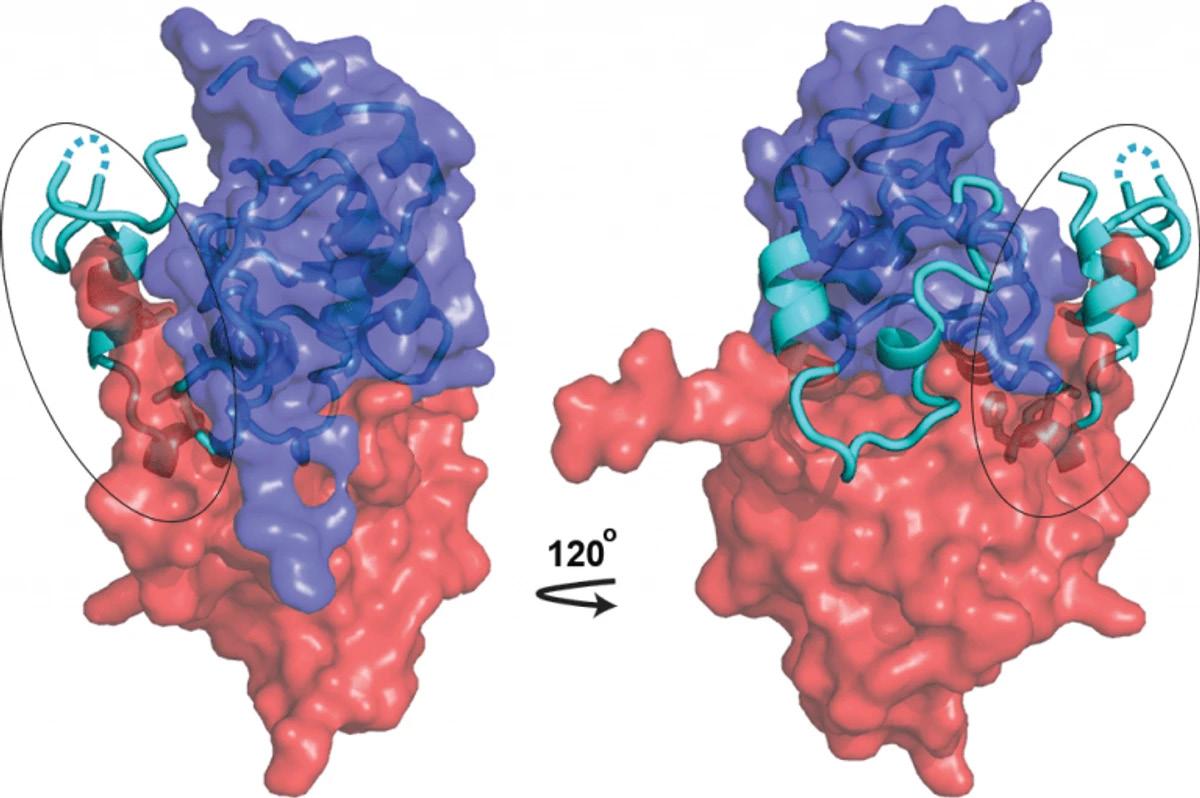
“We have a team of young, enthusiastic students who are eager to learn and keen on producing solid research,” said Jia. “These projects are great training grounds for them. It’s exciting to think how much they will grow in the process. Of course, I hope to be able to grow a little as well myself, learning together with, and sometimes from, my students.
“Before, the pressure was on securing funding to support our work; now it has switched to delivering the results and proving to the reviewers and the NIH that we are worth supporting. That’s what we will be focused on doing in the next few years.”
In essence, our goal is to therapeutically reactivate the host immune mechanisms so that infected cells can be identified and killed by the empowered immune cells.”
- Xiaofei Jia
2023 Annual Research Report 21
Collaborative Research: Harnessing the chirality matching principle for enhanced catalytic reactivity
Wei-Shun Chang
Assistant Professor of Chemistry and Biochemistry
Assistant Professor of Chemistry and Biochemistry Wei-Shun Chang was awarded $190,405 from the National Science Foundation for a collaborative research project with faculty from Kent State University.

Harbin Mao and Hao Shen of Kent State University and Wei-Shun Chang of UMass Dartmouth are studying how chirality (non-superimposable mirror configurations) matching can be used to enhance catalyst design and performance. Developing catalysts with better efficiency to carry out a chemical reaction would be consequential for a variety of fields including synthetic chemistry, materials science, and biomedical science. This interdisciplinary science provides a rich learning environment for a diverse research team that includes members of underrepresented groups across its high school, college, and graduate student members.
TinyML-UUVs: Tiny Machine Learning for Low-Power Unmanned Undersea Vehicles
Yuchou Chang
Assistant Professor of Computer and Information Science
The Office of Naval Research awarded Yuchou Chang a grant in the amount of $225,000 for the project “TinyML-UUVs: Tiny Machine Learning for Low-Power Unmanned Undersea Vehicles.”

This project investigates TinyML, a technique for reducing power consumption and computing resources in machine learning models for unmanned undersea vehicles (UUVs). TinyML-UUVs are expected to increase endurance, adapt quickly to dynamic environments, and perform ubiquitous data collection with minimal communication bandwidth. The project aims to contribute to the Navy’s unmanned systems strategy by developing efficient machine learning/artificial intelligence solutions for small-unmanned systems, ultimately leading to faster mission completion times and improved UUV capabilities.
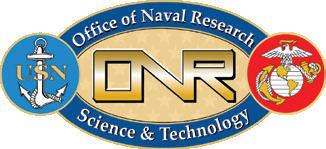
22 UMass Dartmouth
Universal adaptive beamformers
John Buck
Chancellor Professor of Electrical and Computer Engineering
The Office of Naval Research awarded Chancellor Professor John Buck (Department of Electrical and Computer Engineering) a grant in the amount of $977,788 for his project, “Universal Adaptive Beamformers.”
This project aims to improve adaptive beamformers for large arrays in dynamic environments. It proposes using universal algorithms, order statistics, and Random Matrix Theory (RMT) to address the challenges posed by such environments. The major objective of the proposed research is to develop novel adaptive beamformers (ABFs) for passive sonar using universal algorithms and infinite Random Matrix Theory (RMT). Passive sonar is an important element of the Navy’s strategy for anti-submarine warfare (ASW).
The Navy must detect and locate quiet sound sources at tactical ranges in both shallow and deep-water

environments. Moreover, this must be accomplished across a wide range of oceanographic conditions and facing loud interfering sources such as surface shipping, petrochemical exploration and biological sources. Several new and proposed passive sonar systems would greatly increase the number of sensors in arrays, both for fixed surveillance assets and for conformal arrays. This increase in sensor count presents new challenges for passive sonar in the form of both increased computational requirements and coherent averaging to maximize array gain. If successful, the improved ABFs proposed here could transition to towed arrays, conformal arrays and fixed assets.
A New Spin: The next generation of gravitational-wave searches for merging black holes
Sarah Caudill
Assistant Professor of Physics
Current gravitational-wave searches for signals from merging black holes and neutron stars have been extraordinarily successful, allowing us to probe new astrophysics and test strongfield gravity. However, these searches have not yet begun to access the full, rich discovery space of gravitational-wave signals. If binary black holes have large, misaligned spins and asymmetric masses, then the binary’s orbit will precess. The resulting gravitational waves can have significant amplitude and phase modulations, causing the signals to be missed entirely by current searches. The NSF awarded Assistant Professor of Physics Sarah Caudill $180,000 to develop the tools needed to search for and potentially detect this important class of precessing signals.
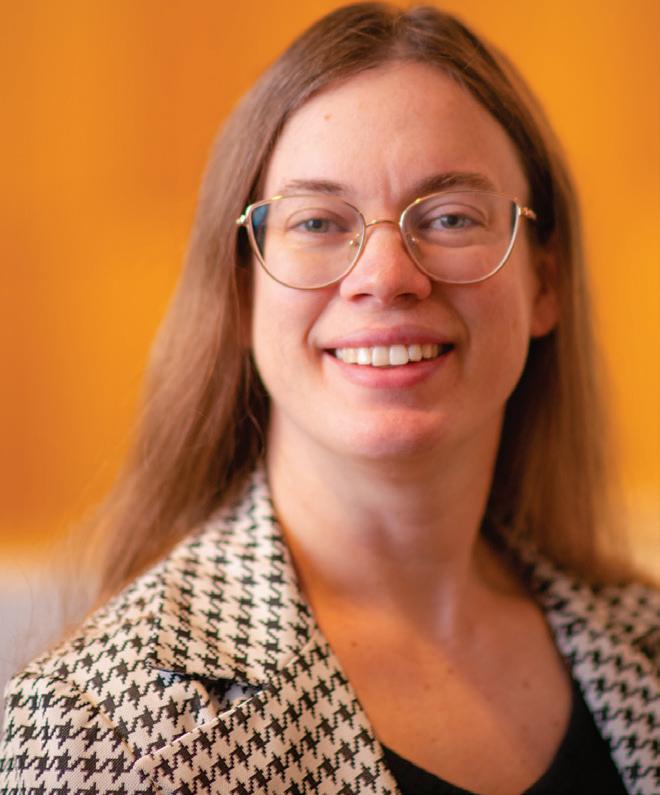
2023 Annual Research Report 23
Gravitational wave models for black hole-neutron stars in general relativity and beyond
Vijay Varma
Professor of Mathematics
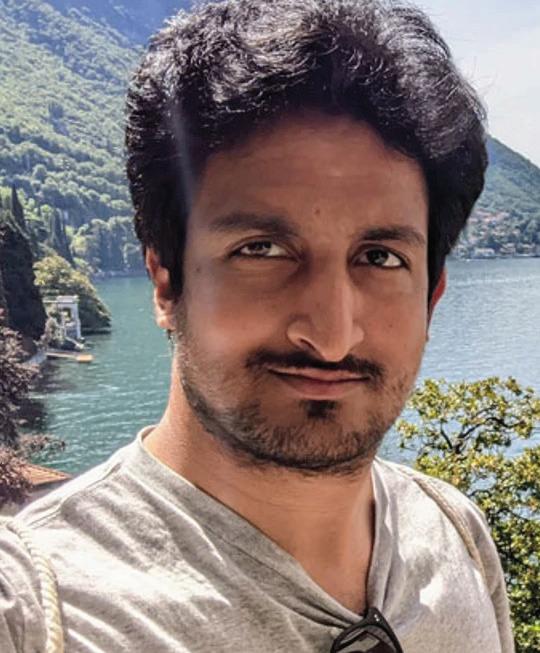
The NSF awarded Assistant Professor of Mathematics Vijay Varma $180,000 to support research on relativity and relativistic astrophysics and delves into the forefront of gravitational wave astronomy. Stemming from the groundbreaking LIGO detectors’ detection of gravitational waves in 2015, this project aims to develop advanced numerical simulations and data-driven models. Focused on black hole-neutron star and binary neutron star mergers, the simulations test Einstein’s theory of general relativity and alternative theories like scalar-tensor gravity under extreme conditions. This research also trains students in essential computational skills relevant to data science and machine learning, preparing them for diverse careers.
Conservative discontinuous Galerkin methods with implicit penalty parameters and multiscale hybridizable discontinuous Galerkin methods for PDEs
Bo Dong
Associate Professor of Mathematics
The NSF awarded Associate Professor of Mathematics Bo Dong $365,401 to develop new computational methods for problems with conserved properties or highly oscillatory solutions. The conservative methods, enforced via implicit penalization, accurately and stably simulate over long periods and are useful for fluid dynamics, nonlinear optics, plasma physics, and Bose-Einstein condensates. The multiscale methods, which integrate the HDG framework and multiscale basis functions, efficiently capture highly oscillatory solutions and are impactful in quantum mechanics. These methods address unresolved theoretical issues and provide frameworks for solving other complex problems. The project also involves mentoring and training of students, including underrepresented groups, and provides them with opportunities to integrate research into their education.
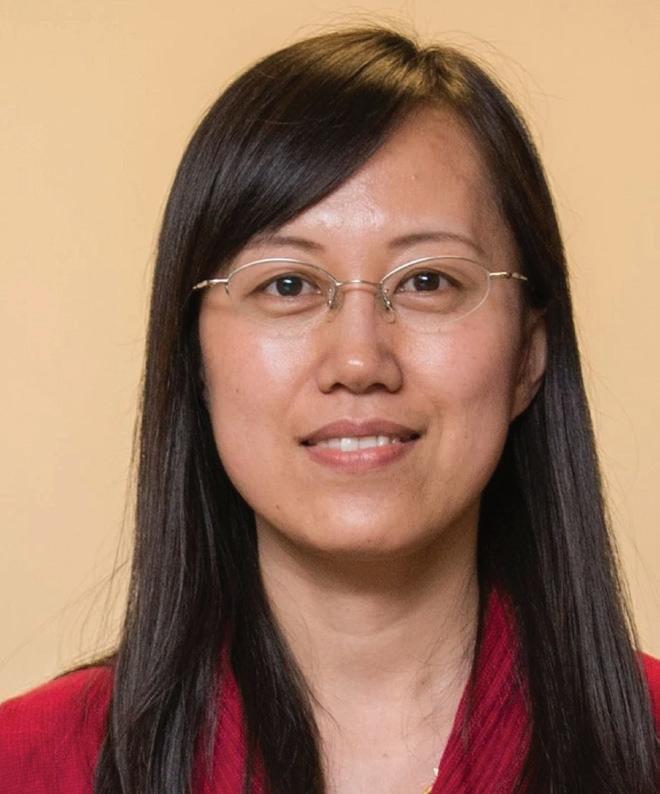
24 UMass Dartmouth
Commonwealth Professor wins four MassDOT grants
Walaa Mogawer
Commonwealth Professor of Civil and Environmental Engineering
Commonwealth Professor of Civil and Environmental Engineering Walaa Mogawer received four awards from the Massachusetts Department of Transportation combining to total $2.7M over the life of each award.
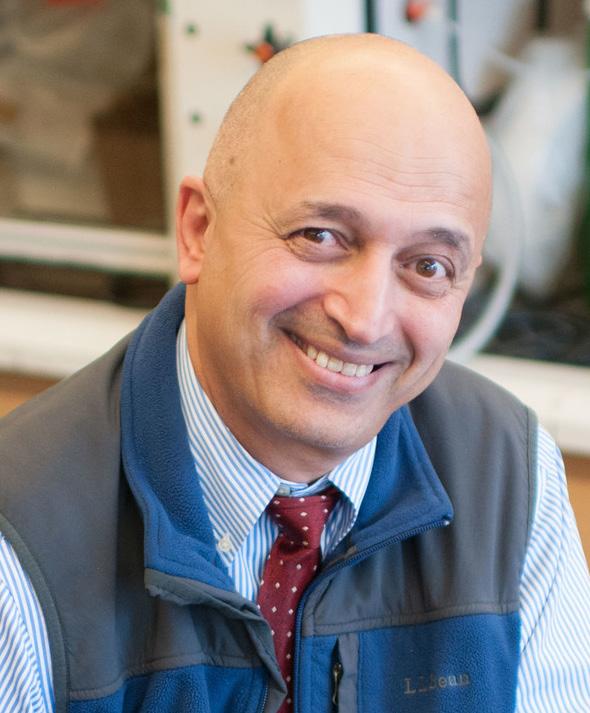
The first award is a field study to determine salt usage efficiency on both dense and open-graded pavement types to evaluate environmental impacts of salt entering nearby water sources, and whether certain pavement surface types are being over-treated during winter maintenance. The research will attempt to identify the most appropriate winter maintenance practices, including salt application rates, for both pavement types. Furthermore, the research results could then be integrated into MassDOT’s winter maintenance best practices and related contracting.
The second award is for the third phase of a multi-year study aimed at implementing the American Association of State Highway & Transportation Official’s (AASHTO’s) Pavement Mechanistic Empirical Design (PMED) method in Massachusetts. The method predicts pavement distresses utilizing prediction models that were developed and nationally calibrated using in-service pavements. To accurately predict the performance in Massachusetts, these models will need to be calibrated according to Massachusetts local conditions. The main objective of phase 3 is to collect relevant field and laboratory data needed for the local calibration.
The third study assesses the implications of changes in asphalt binder formulation and the source for binders used in Massachusetts. Data will be analyzed in an attempt to develop a parameter or multiple parameters that can distinguish between the qualities of asphalt binders. The parameter(s) will be included in a roadmap for MassDOT to update its material specifications.

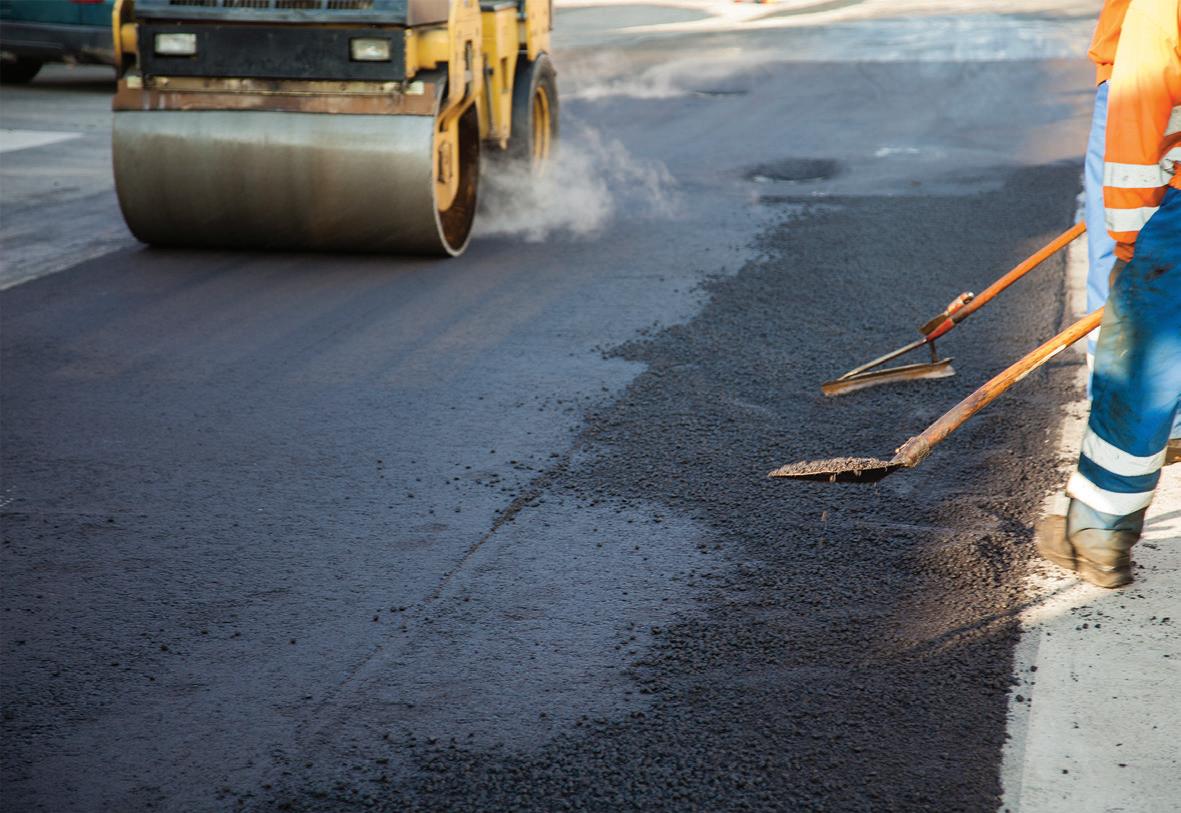
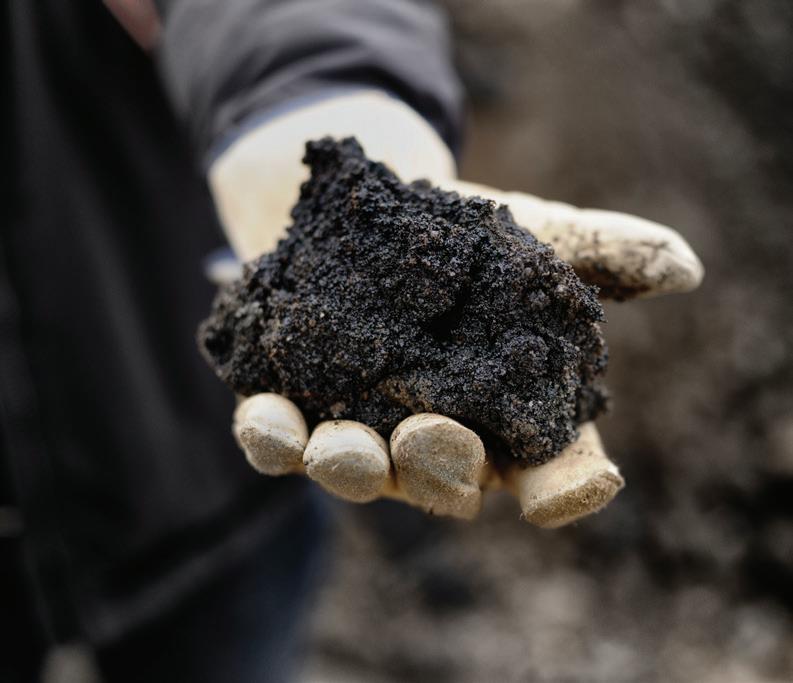
The fourth award supports various activities of the pavement management, pavement research, and materials units at MassDOT for approximately three and a half years. This includes evaluating mixtures containing high amounts of recycled materials for high and low volume roads, developing cold recycling specifications, pavement friction and density testing in the field with state-ofthe-art equipment, evaluation of asphalt tack coats, development of laboratory aging protocols for mixtures, developing and incorporating a sustainability evaluation method into MassDOT protocols, and development and delivery of training seminars for both MassDOT and industry on emerging areas in the pavement field.
2023 Annual Research Report 25
Re-Generation: a sculptural installation
that highlights cultural and environmental research on the industrial legacy of Central New York
Rebecca Hutchinson
Professor of Art & Design
Re-Generation, a sculptural installation displayed at the Everson Museum of Art in Syracuse, NY, highlighted Art & Design Professor Rebecca Hutchinson’s cultural and environmental research on the industrial legacy of Central New York. Along with its salt mines, Syracuse also possessed massive deposits of soda ash, a material used in ceramics manufacture. These materials, in tandem with an influx of European immigrants with craft and material expertise, led to the development of Syracuse China in the late 19th century, which quickly grew into one of the nation’s largest dinnerware manufacturers.
Reflecting on the decline of soda ash mining and the closure of Syracuse China, Re-Generation took the form of large unfired paper clay vessels installed in an inverted position, showcasing on the surface drawings of rare orchids that have evolved out of the polluted soil and are currently thriving in the Syracuse region.
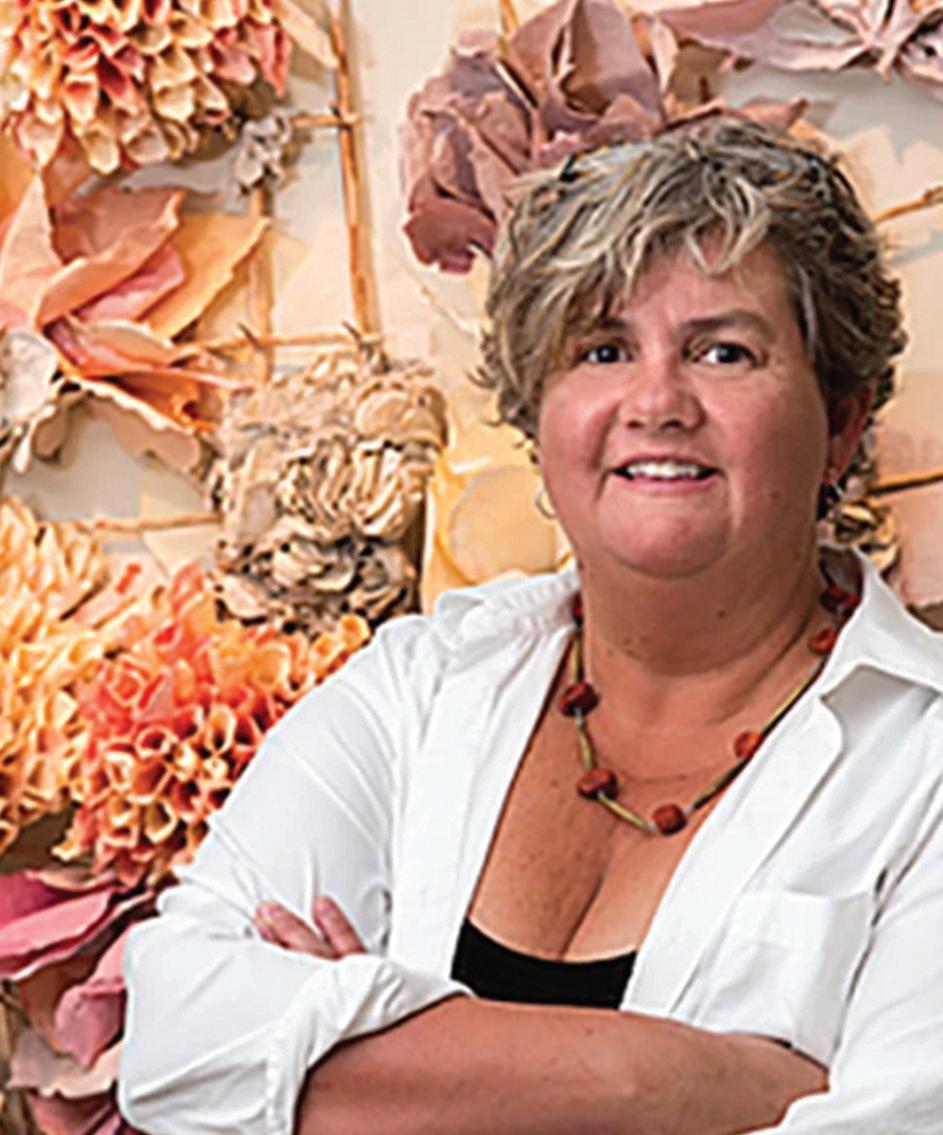

Art & Design faculty publishes, “Personal History”
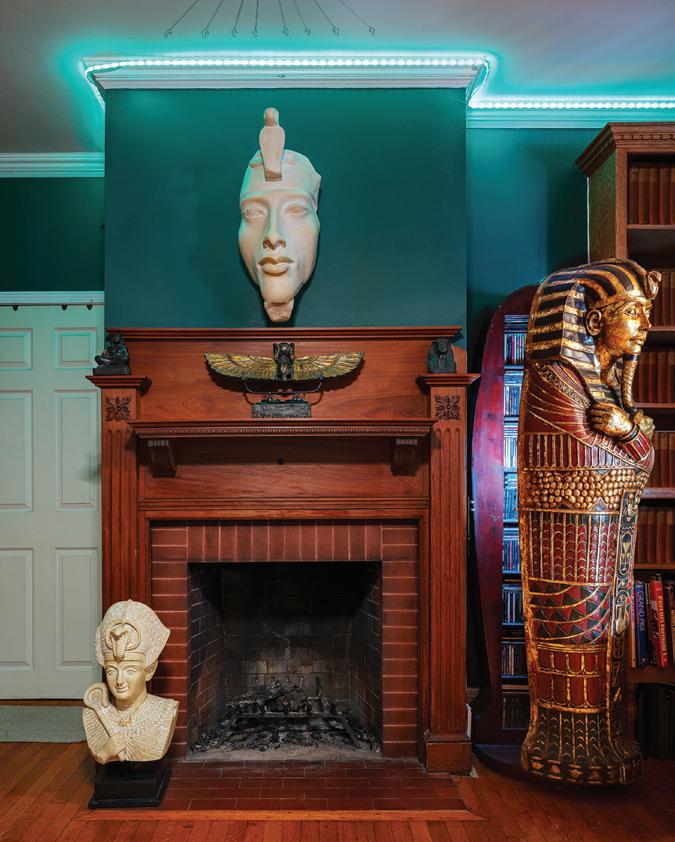
Sarah Malakoff
Associate Professor of Art & Design
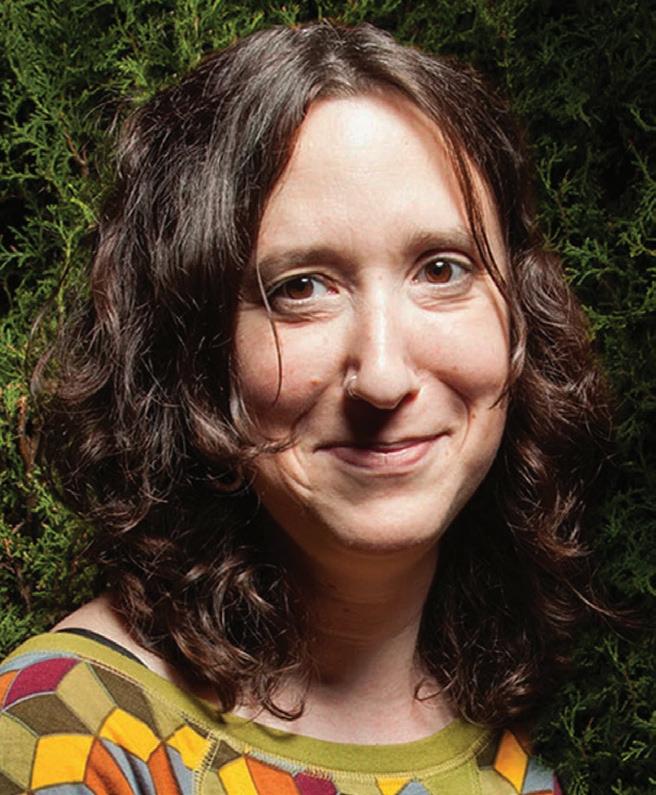
Associate Professor of Art & Design, Sarah Malakoff uses photography to investigate domestic interiors as both a refuge from and re-creation of the outside world. Her book, Personal History, presents objects displayed within American homes that reference culture, history, and ideology. Whether representations of historical figures, events, or monuments, the possessions point to a longing for a connection to the past and an engagement with the world at large. Often the collections of objects underscore the privilege and power implicit in the act of collecting. The Blue Sky Gallery in Portland, Oregon will feature Malakoff’s work in a solo exhibition in March 2024.
26 UMass Dartmouth
ORA Report
As someone deeply invested in the advancement of knowledge and innovation, I believe it is important to recognize and prioritize the role of research administration in facilitating and fostering impactful research endeavors.
Research administration serves as the backbone that connects researchers, funding agencies, regulatory bodies, and various stakeholders, facilitating the seamless execution and management of sponsored research. With a myriad of responsibilities ranging from proposal submission, post-award grant management, accounting, reporting and compliance oversight, research administrators play a pivotal role in shaping the trajectory of scientific inquiry and discovery.
One of the primary functions of research administration is to facilitate the acquisition and management of sponsored research funding. In an increasingly competitive funding landscape, research administrators play a crucial role in identifying funding opportunities, assisting researchers in preparing grant proposals, and ensuring compliance with funding agencies’ requirements. By navigating the intricacies of granting agency requirements and managing funding awards efficiently, research administrators empower researchers to focus on their scientific pursuits.
Moreover, research administration is indispensable for ensuring compliance with a myriad of regulatory frameworks governing research activities. Whether it pertains to financial regulations, ethics approvals, or intellectual property rights, adherence to regulatory requirements is essential for upholding the integrity and credibility of scientific research. Research administrators serve as stewards of compliance, providing guidance and oversight to principal investigators and their teams to ensure that their endeavors adhere to the highest ethical and legal standards.
By streamlining administrative processes, providing strategic guidance, and fostering a culture of compliance and collaboration, the Office of Research and Innovation (ORI) aims to ensure the success of the overall research enterprise at UMass Dartmouth. The information in the next pages highlights the continued growth and success of the research enterprise. I am most grateful to the entire ORI team for their diligent efforts and unwavering support.
 Megan Hennessey-Greene Assistant Vice Chancellor for Research and Innovation
Megan Hennessey-Greene Assistant Vice Chancellor for Research and Innovation
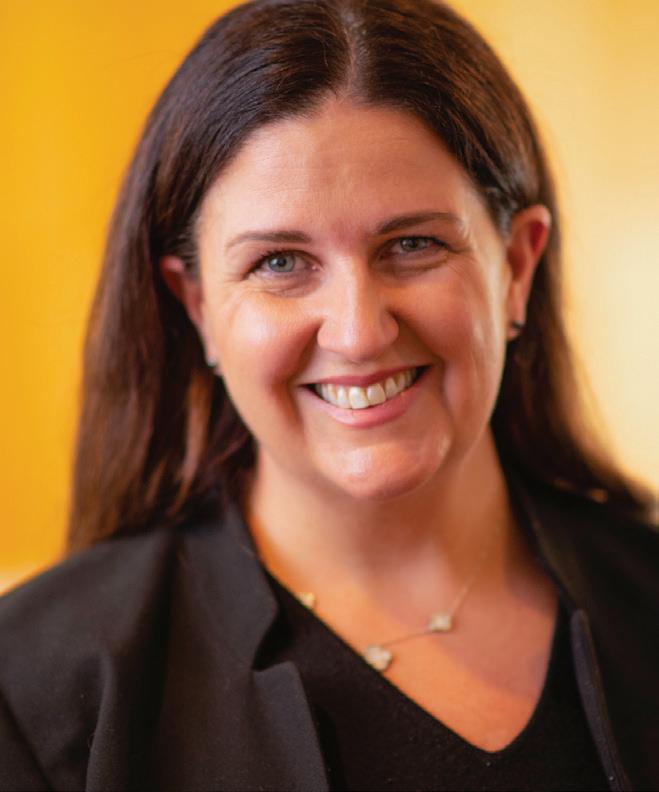
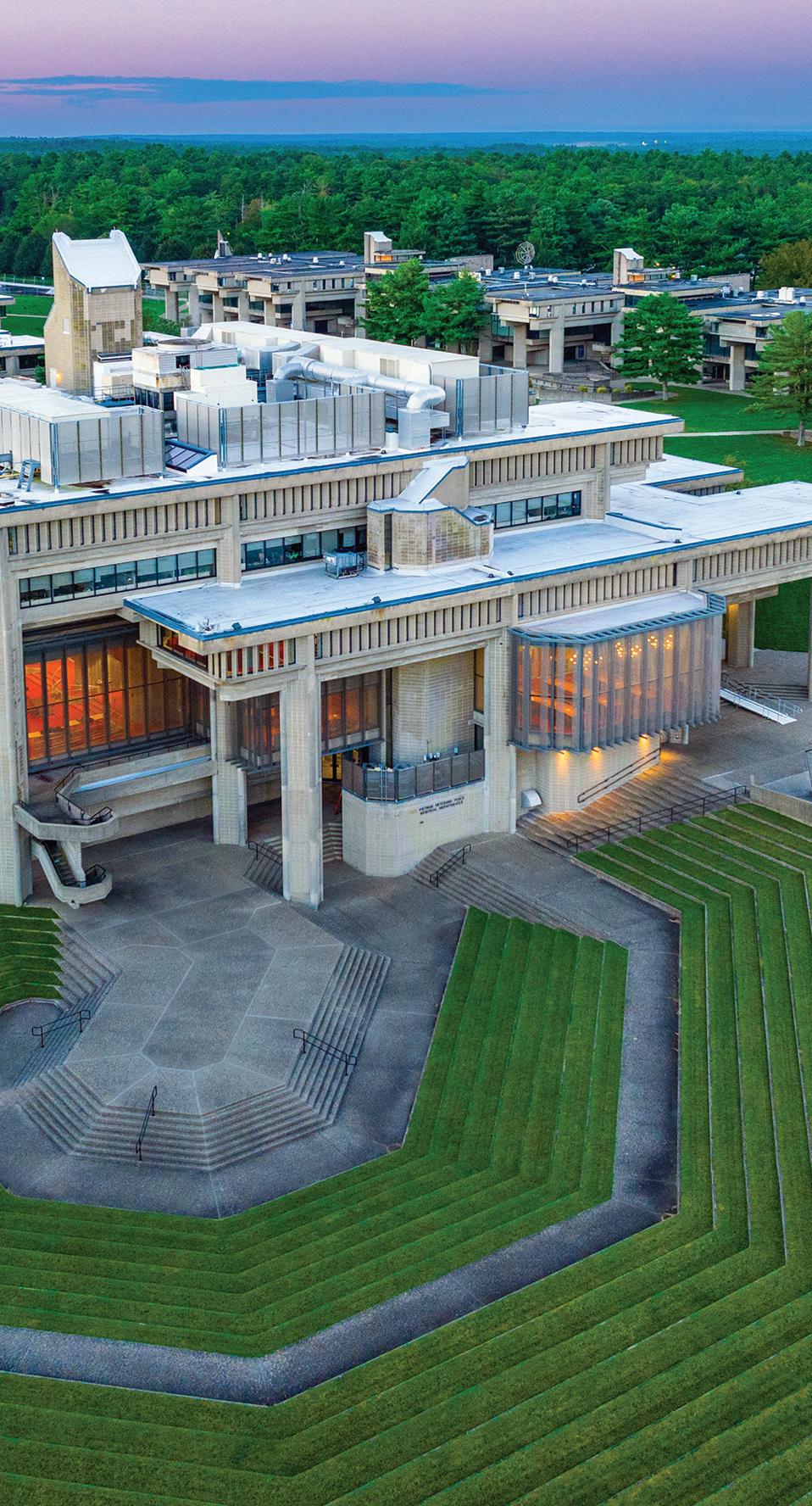
Office of Research Administration
2023 Annual Research Report 27
Proposals
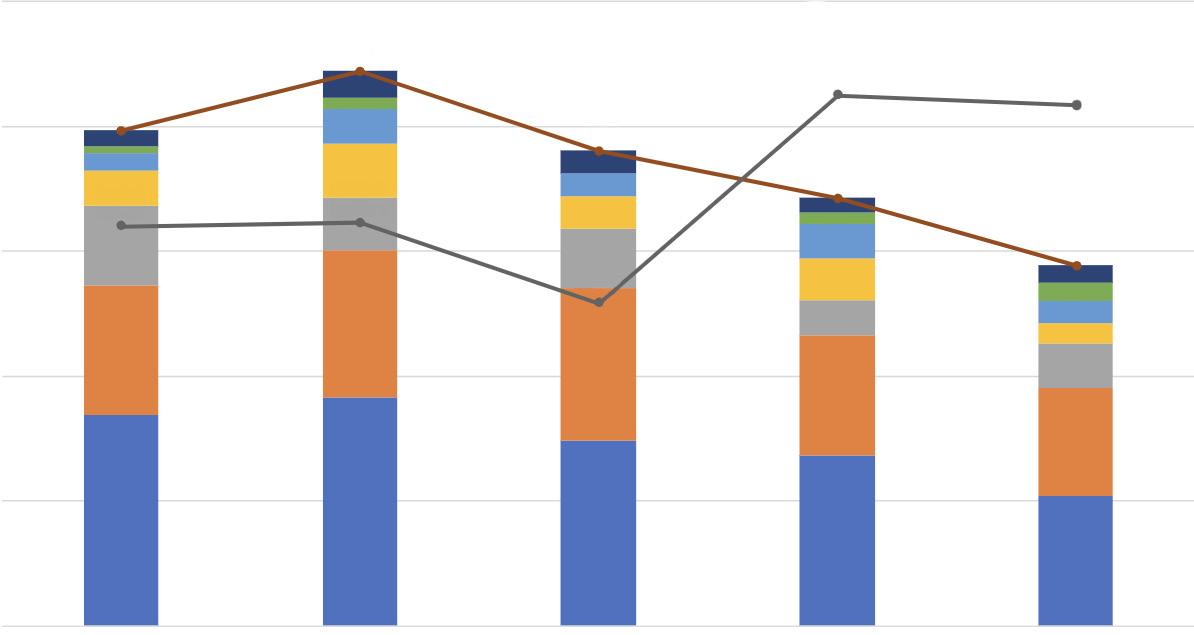
- FY2023 (000’s)
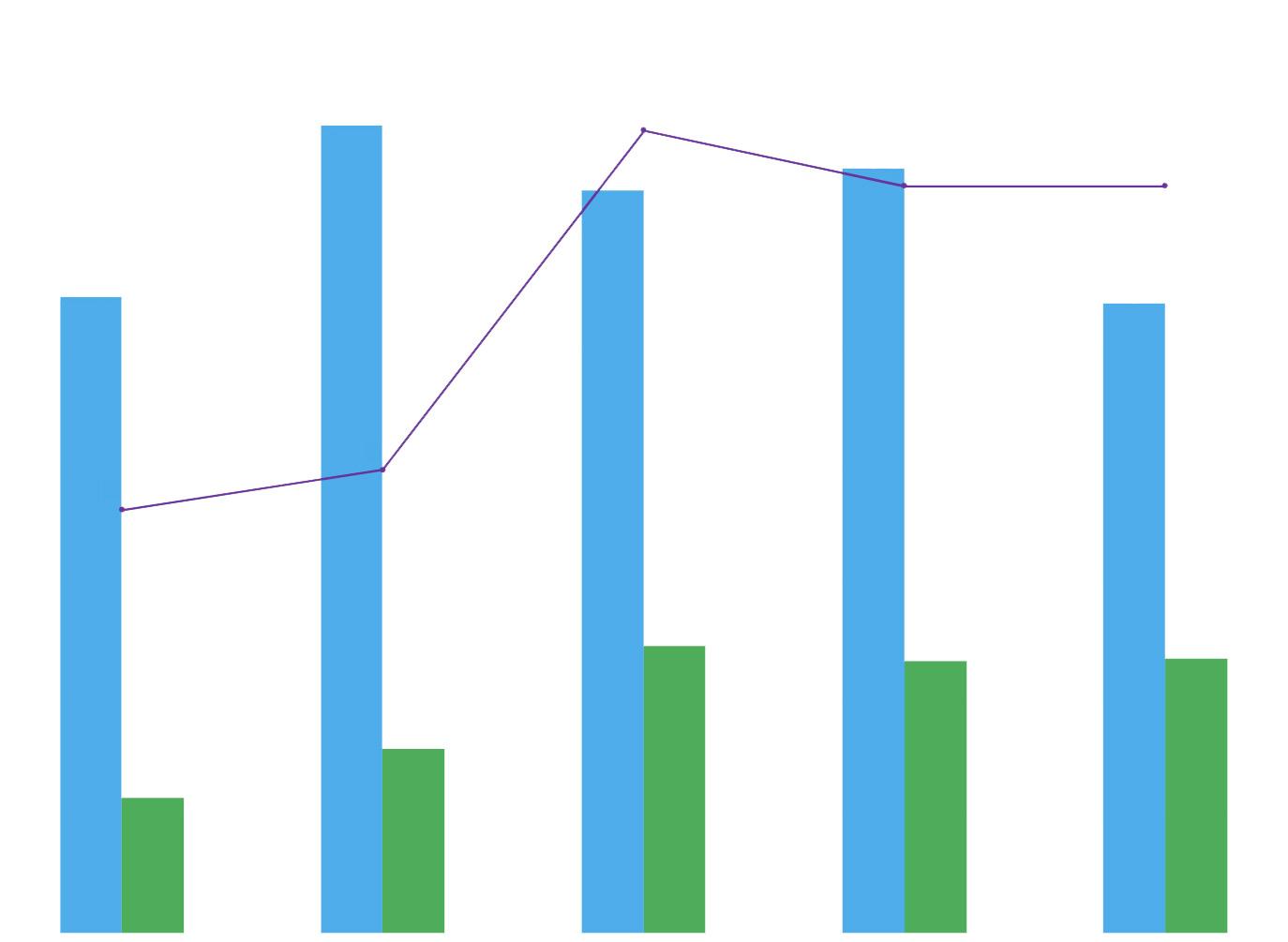
28 UMass Dartmouth Metrics
Depart ment of Health and Human Serv ices Non Federal Depart ment of Defense Other Federal Sources National Science Foundation Depart ment of Commerce (NOA A) National Aero and Space Administration % Awarded Grand Total FY2019 FY2020 FY2021 FY2022 FY2023 60% 250 50% 200 40% 150 30% 100 20% 50 10% 0 0% 198 190 171 144 222 38% 39% 31% 51% 50%
Requested v.
- FY2023
FY2019 FY2020 FY2021 FY2022 FY2023 Requested $ Awarded $ % Awarded 45% $80.0 $40.0 $60.0 $20.0 $70.0 $30.0 $50.0 $10.0 $–40% 35% 30% 25% 20% 15% 10% 5% 0% $56.9M $70.8M $63.6M $65.5M $53.9M 22% 39% 36% 36% 20%
Submitted and Percentage Awarded FY2019
Funding
Awarded FY2019
(000’s)
New Awards FY2019 - FY2023 (000’s)

Active Awards 5-Year Trend FY2019 - FY2023 (000’s)
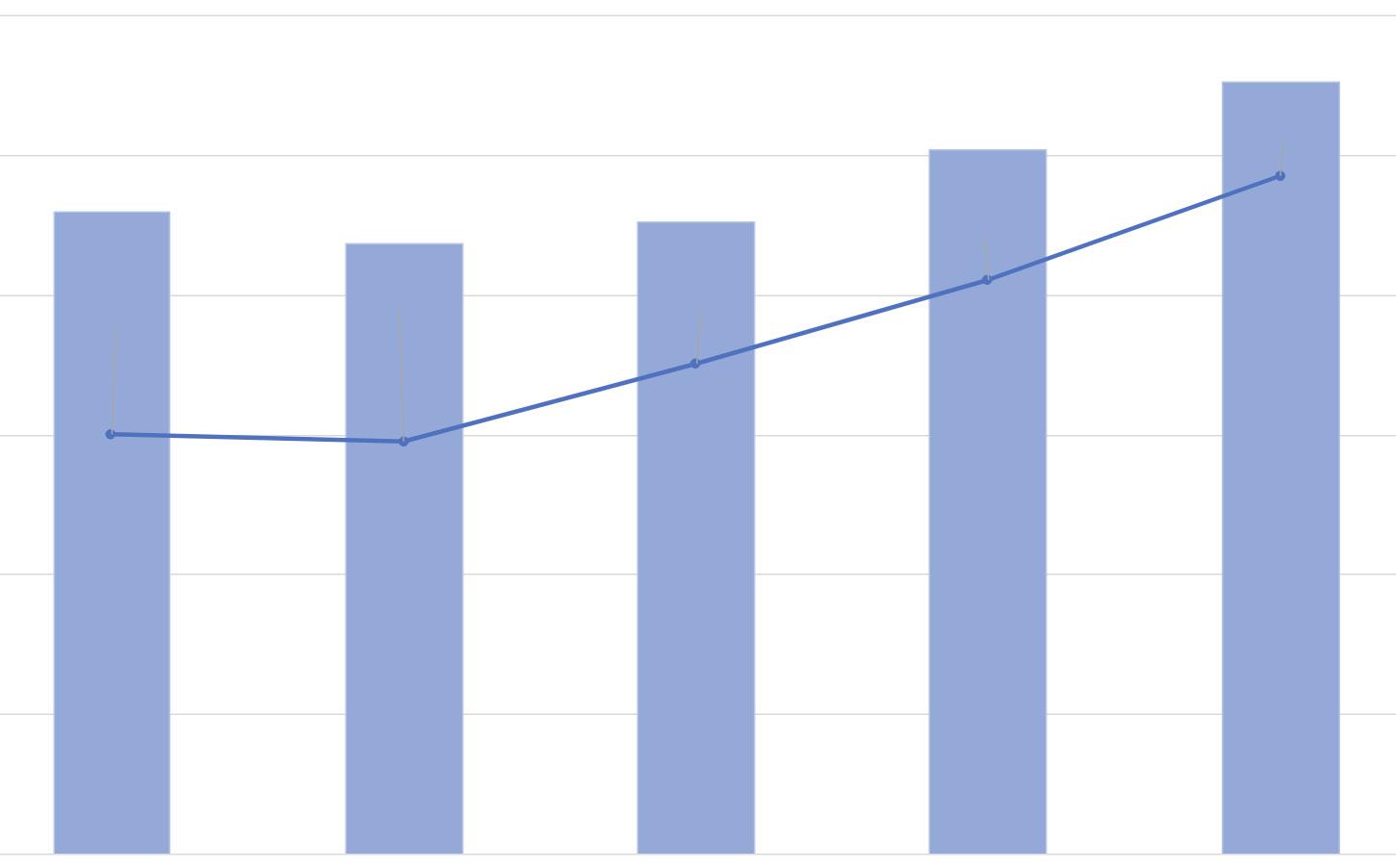
2023 Annual Research Report 29 Metrics
$–Non Federa l Depart ment of Education National Science Foundation Depart ment of Health and Human Services Depart ment of Commerce (NOA A) Other Federal Sources Depart ment of Defense Grand Total FY2019 FY2020 FY2021 FY2022 FY2023 $25,000 $30,000 $20,000 $15,000 $10,000 $5,000 $20.5M $19.4M $29.3M $27.1M $16.0M
FY2019 FY2020 FY2021 FY2022 FY2023 322 255 294 264 268 # Awards # Dollars (000’s) 150 250 200 100 50 0 100.0 80.0 60.0 40.0 20.0 $61.5M $59.1M $82.1M $96.9M $60.1M 120.0 300 350
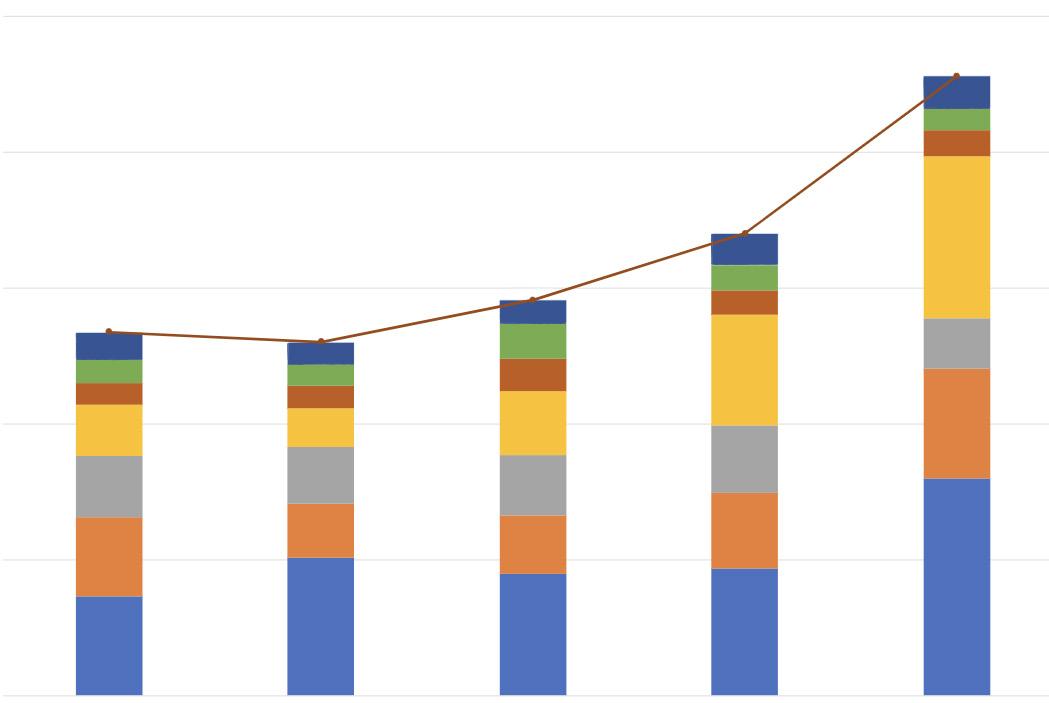
Non Federa l
Depart ment of Education
National Science Foundation
Depart ment of Health and Human Services
Depart ment of Commerce (N OA A)
Other Fe deral Sources
Depart ment of Defense
Grand Total
30 UMass Dartmouth Metrics $5,000
$20,000 $25,000 $10,000 $0 $15,000 $22.8M $13.4M $14.6M $17.0M $13.0M
Sponsored Research Expenditures FY2019 - FY2023 (000’s) FY2019 FY2020 FY2021 FY2022 FY2023
Top 10 Grant Award Recipients in FY 2023
Ramprasad Balasubramanian
Kevin D.E. Stokesbury
Lance N. Fiondella
Lisa A. Jochim
Xiaofei Jia
Sokratis
Miles A. Sundermeyer
Changsheng
OFFICE OF NAVAL RESEARCH
CLEARWATER SEAFOODS
Grand Total
COMMERCIAL FISHERIES RESEARCH FOUNDATION
COMMONWEALTH WIND
COONAMESSETT FARM FOUNDATION, INC.
MA DIVISION OF MARINE FISHERIES
NATIONAL OCEANIC AND ATMOSPHERIC ADMIN
PARK CITY WIND
VINEYARD OFFSHORE
COMMONWEALTH OF MASSACHUSETTS
NATIONAL SCIENCE FOUNDATION
MA DEPT OF ELEMENTARY & SECONDARY ED
NIH-NATIONAL INSTITUTES OF HEALTH
U.S. DEPARTMENT OF EDUCATION
NATIONAL SCIENCE FOUNDATION
INTELLISENSE SYSTEMS, INC.
MASHPEE WAMPANOAG TRIBE
NP PHOTONICS, INC.
TOWN OF MASHPEE
TOWN OF ORLEANS
TOWN OF PLYMOUTH
TOWN OF WEST TISBURY
TOWN OF YARMOUTH
U.S. GEOLOGICAL SURVEY
WESTPORT WATERSHED ALLIANCE
GULF OF MAINE LOBSTER FOUNDATION
MA DIVISION OF MARINE FISHERIES
Grand Total
Grand Total
Grand Total
Grand Total
Grand Total
Grand Total
Grand Total
NE REG ASSOC OF COASTAL OCEAN OBSERV SYS
WOODS HOLE OCEANOGRAPHIC INSTITUTION
Grand
MASSACHUSETTS LIFE SCIENCES CENTER
Grand
Grand
2023 Annual Research Report 31 Metrics
Total
Total
Koumas
Chen Frank J. Scarano
Ming Shao
Name Sponsor Amount
Total: $ 14,632,636 $3,463,000 $3,463,000 $32,750 $173,278 $33,105 $73,129 $350,000 $1,462,427 $68,635 $609,993 $2,803,317 $499,999 $1,394,352 $1,894,351 $1,142,608 $1,142,608 $1,069,907 $1,069,907 $949,502 $949,502 $912,955 $912,955 $75,000 $8,400 $250,000 $2,800 $134,776 $17,180 $12,597 $21,547 $340,945 $5,120 $868,365 $17,997 $100,000 $578,606 $82,062 $778,665 $749,966 $749,966 For a complete list of awards, please visit: umassd.edu/research
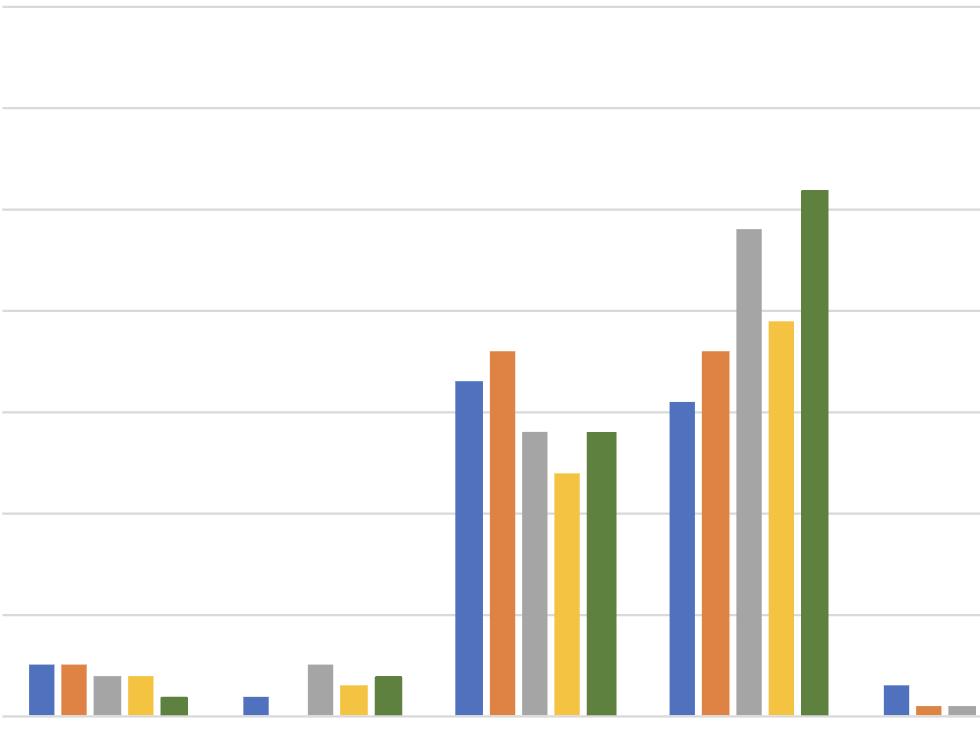
Metrics Number of Awards FYs 2019-2023 Academic Affairs Others College of Arts & Sciences College of Engineering College of Nursing Health Sciences 0 10 20 30 40 50 60 70 80 FY 2023 FY 2019 FY 2020 FY 2021 FY 2022 32 UMass Dartmouth
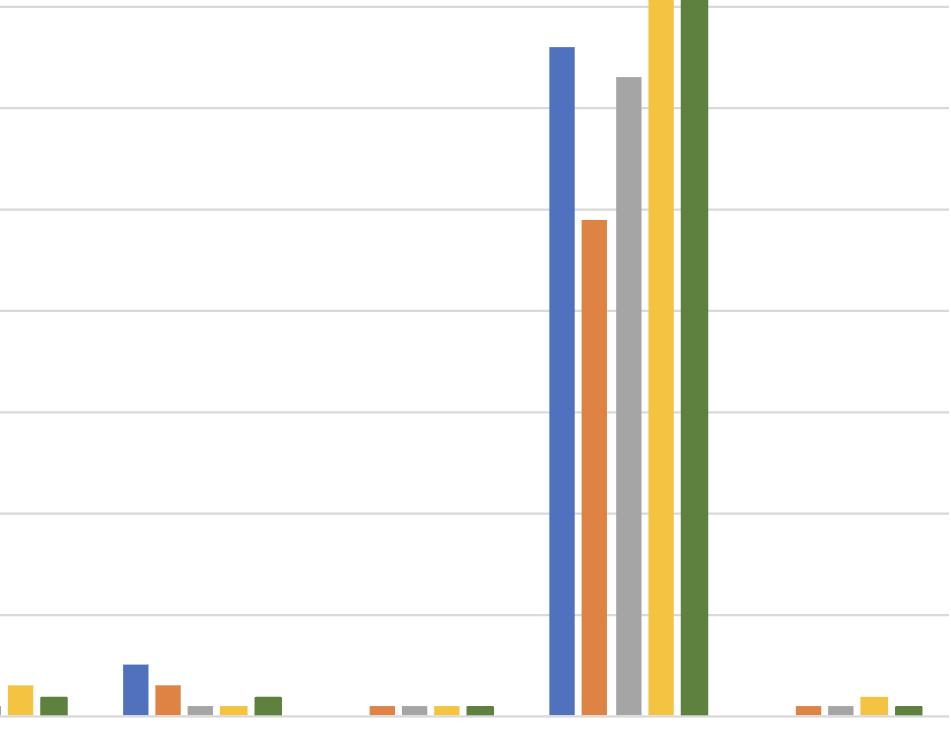
Year Award Count 2019 145 2020 132 2021 152 Year Award Count 2022 150 2023 167 Nursing & Sciences School for Marine Science & Technology UMass School of Law at Dartmouth Office of the Chancellor MUST Award 2023 Annual Research Report 33
Metrics
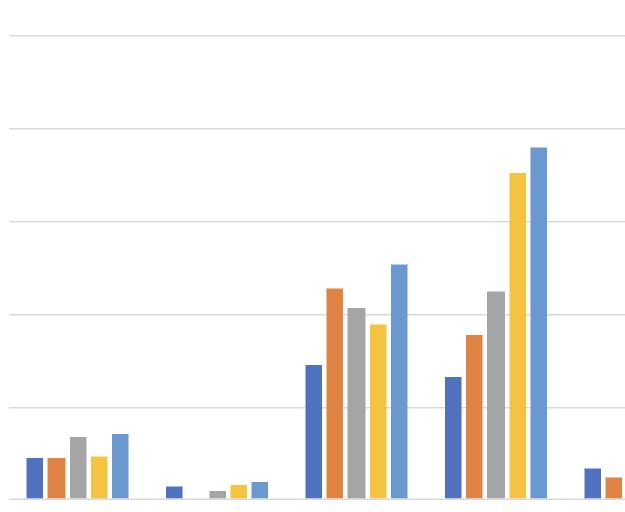
Metrics 34 UMass Dartmouth
Academic Affairs Others
College of Arts & Sciences
0 $2M $4M $6M $8M $10M Award Amounts FY2019
FY2023 FY 2023 FY 2019 FY 2020 FY 2021 FY 2022
College of Engineering College Health
–

Metrics 2023 Annual Research Report 35 of Nursing & Health Sciences School for Marine Science & Technology UMass School of Law at Dartmouth Office of the Chancellor MUST Award Sum Amount Year Total 2019 $16,018,843 2020 $20,484,076 2021 $19,426,344 Sum Amount Year Total 2022 $26,781,497 2023 $27,468,835 Grand Total $110,179,595
Federal Awards by Agency FY 2023
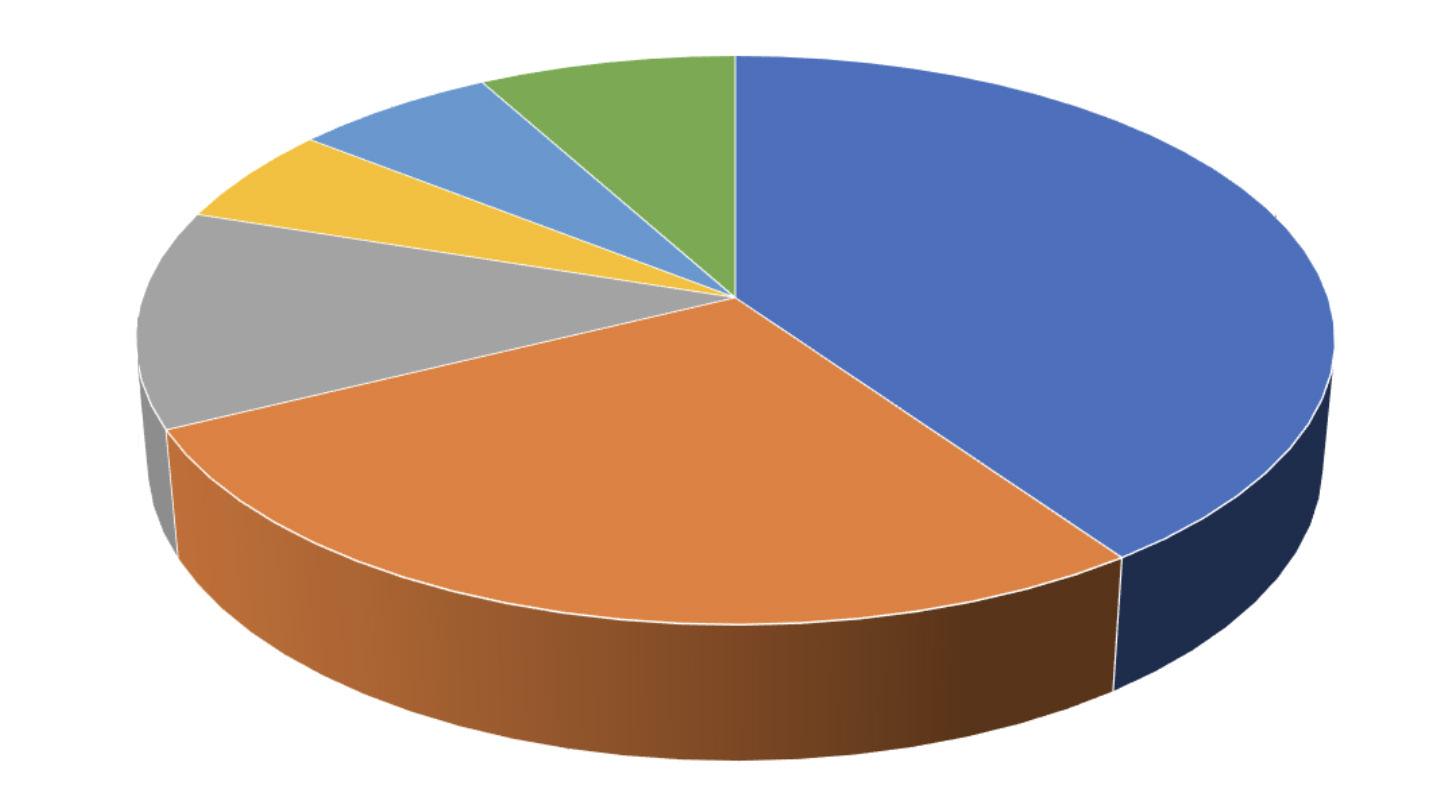
Metrics 36 UMass Dartmouth
Agency Name Amount % Department of Defense $5,971,986 40% National Science Foundation $4,054,975 27% Department of Commerce (NOAA) $1,836,102 13% Department of Health & Human Services $829,046 6% Department of Education $936,248 6% Other $1,188,018 8% Grand Total $14,816,376 100% Department of Health & Human Services 6% National Science Foundation 27% Department of Commerce (NOAA) 13% Other 8% Department of Education 6% Department of Defense 40%

Metrics 37
2019 Research $11,216,620 Instruction/Training $923,175 Other Sponsored Activities $3,872,911 2020 Research $18,243,616 Instruction/Training $1,022,102 Other Sponsored Activities $1,224,496 2021 Research $16,677,603 Instruction/Training $524,439 2022 Research $24,107,051 Instruction/Training $702,729 Other Sponsored Activities $1,971,717 2023 Research $23,920,047 Instruction/Training $1,627,147 Other Sponsored Activities $1,921,642 FY2019 FY2020 FY2021 FY2022 FY2023 $15,000 $20,000 $25,000 $10,000 $5,000 2023 Annual Research Report Research Instruction/Training
Awards by Purpose FY2019 - FY2023 (000's)
Other Sponsored Activities
Awards by Unit & Department FY 2023

Metrics 38 UMass Dartmouth
College of Engineering 27% College of Arts & Sciences 18% MUST Award 13% Academic Affairs 5% College of Nusing & Health Sciences 3% Other 2% School for Marine Science & Technology 32% Unit Name Amount Awards School for Marine Science & Technology $8,673,954 75 College of Engineering $7,563,997 52 MUST Award $3,463,000 1 College of Arts & Sciences $5,068,322 28 Academic Affairs $1,395,189 2 College of Nursing & Health Sciences $788,584 2 Other $515,790 5 Grand Total $27,468,835 165
Proposals by College FY 2023
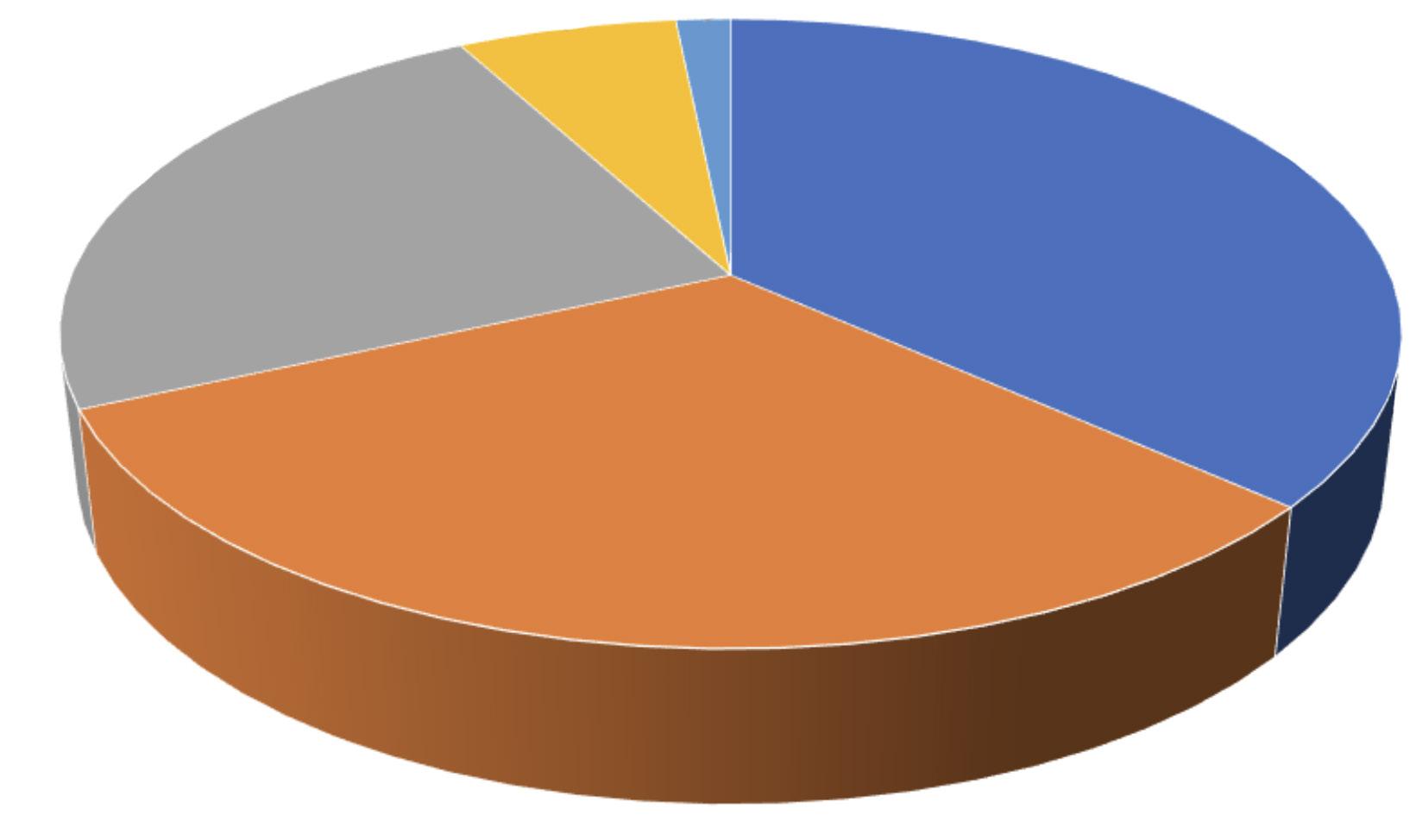
Metrics 2023 Annual Research Report 39
College of Engineering 37% College of Arts & Sciences 24% MUST 6% Other 1% School for Marine Science & Technology 32% Unit Name Award Amount College of Engineering 49 $20,062,363 School for Marine Science & Technology 58 $17,306,658 College of Arts & Sciences 30 $13,018,951 MUST Award 1 $3,462,999 Other 9 $865,181 Grand Total 147 $54,716,152 % 37% 32% 24% 6% 2% 100%
Expenditures
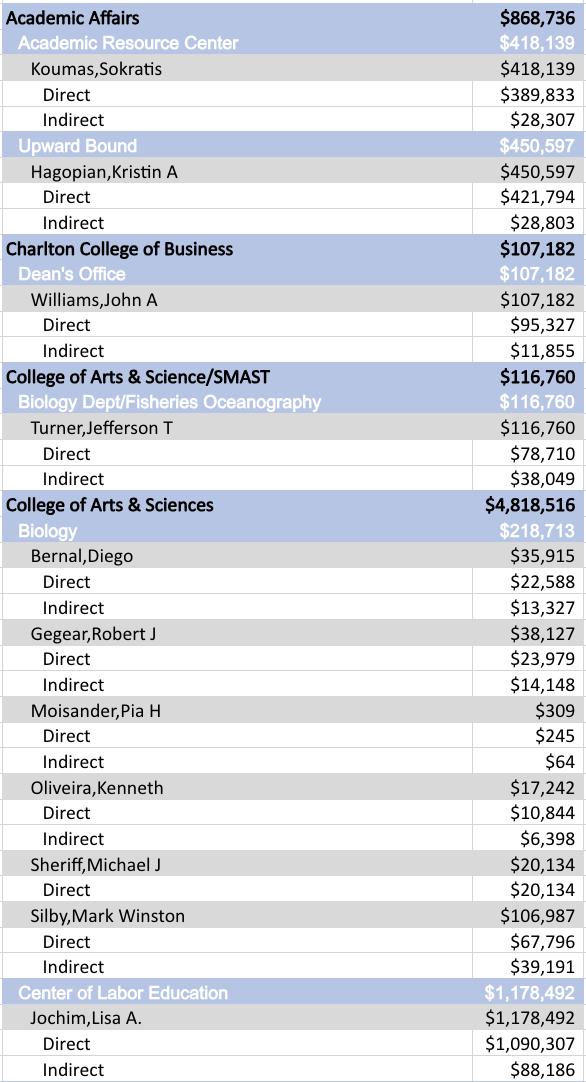
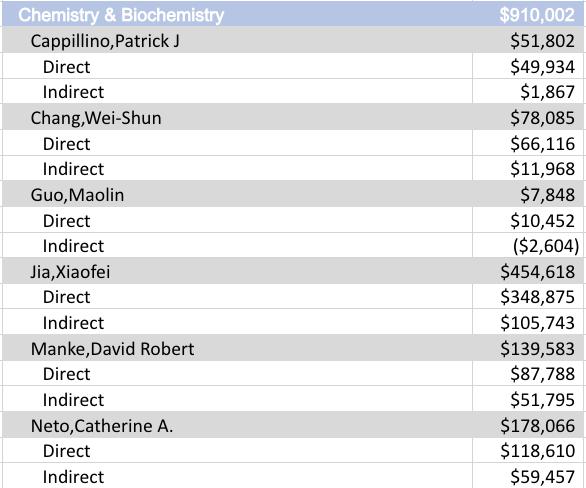

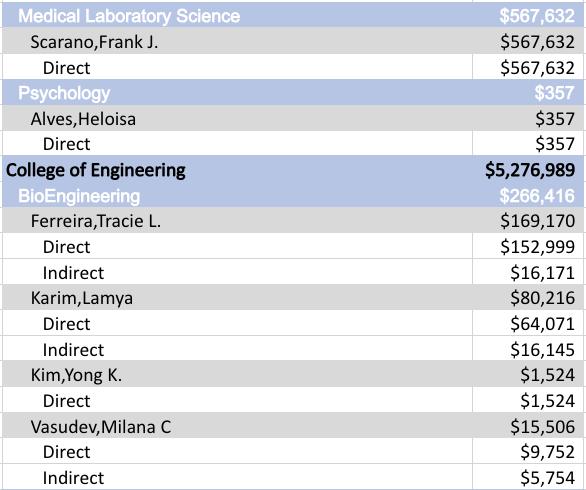
Metrics 40 UMass Dartmouth
College, Department
PI
by
&
FY 2023


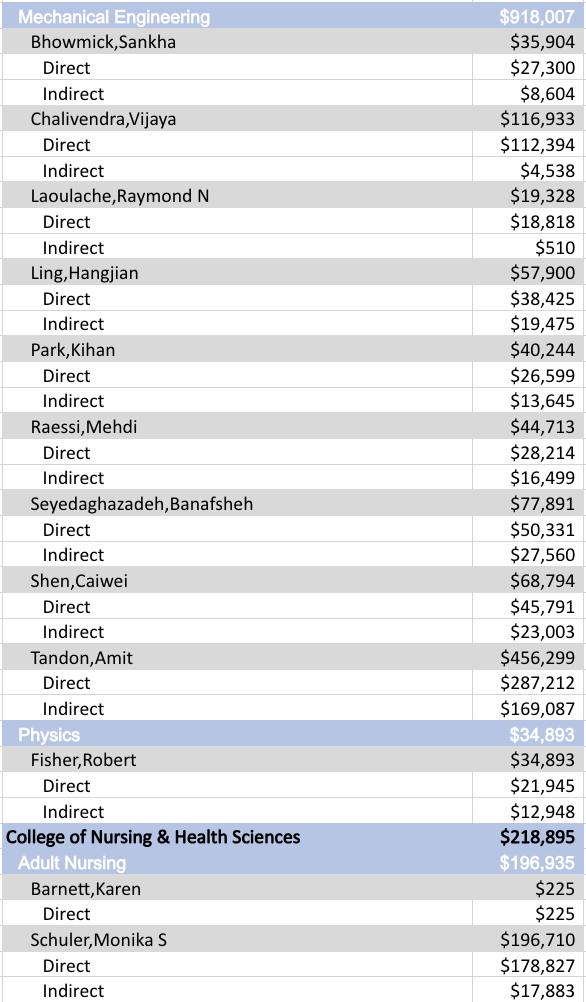
Metrics 2023 Annual Research Report 41
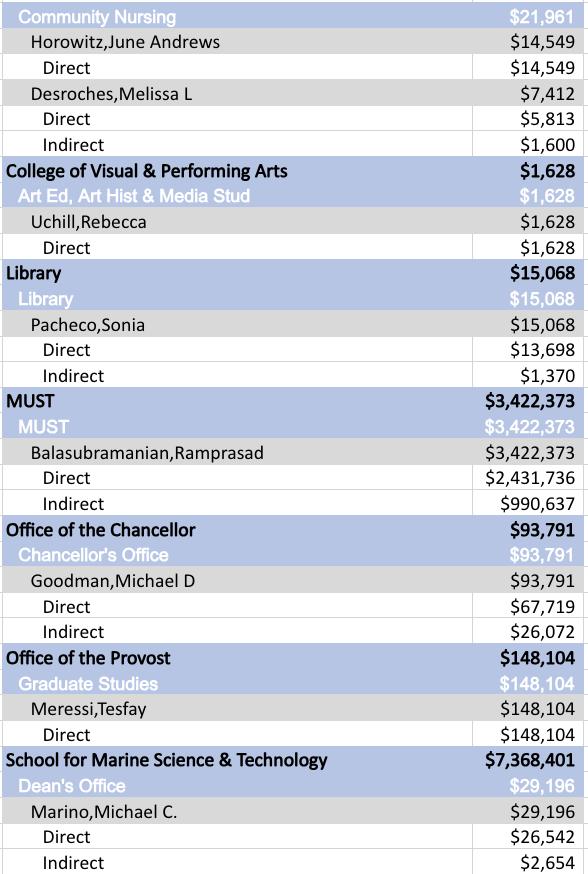
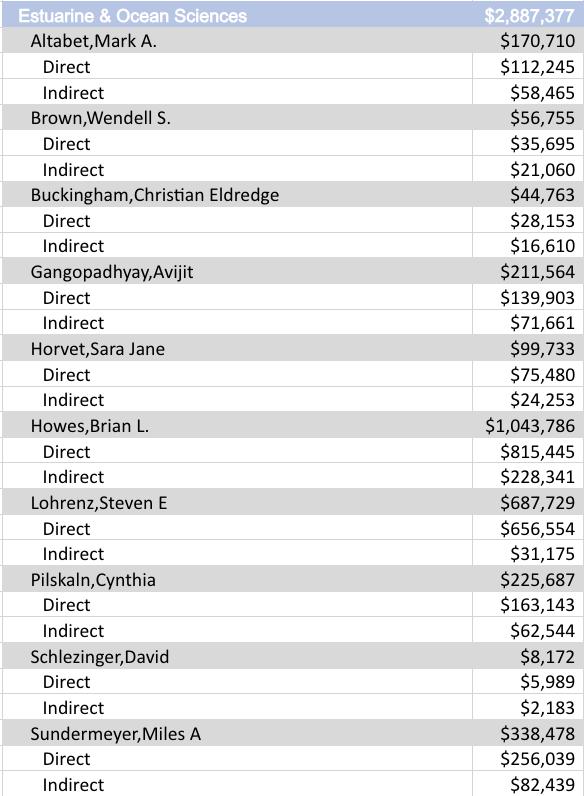
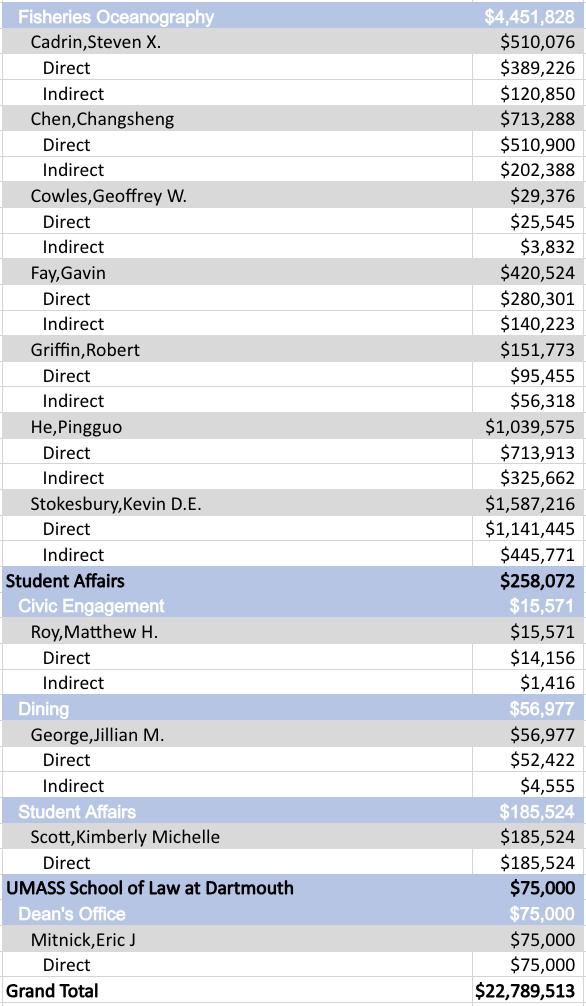
Metrics 42 UMass Dartmouth
Department & PI FY 2023 (continued)
Expenditures by College,
Awards by College FY 2023
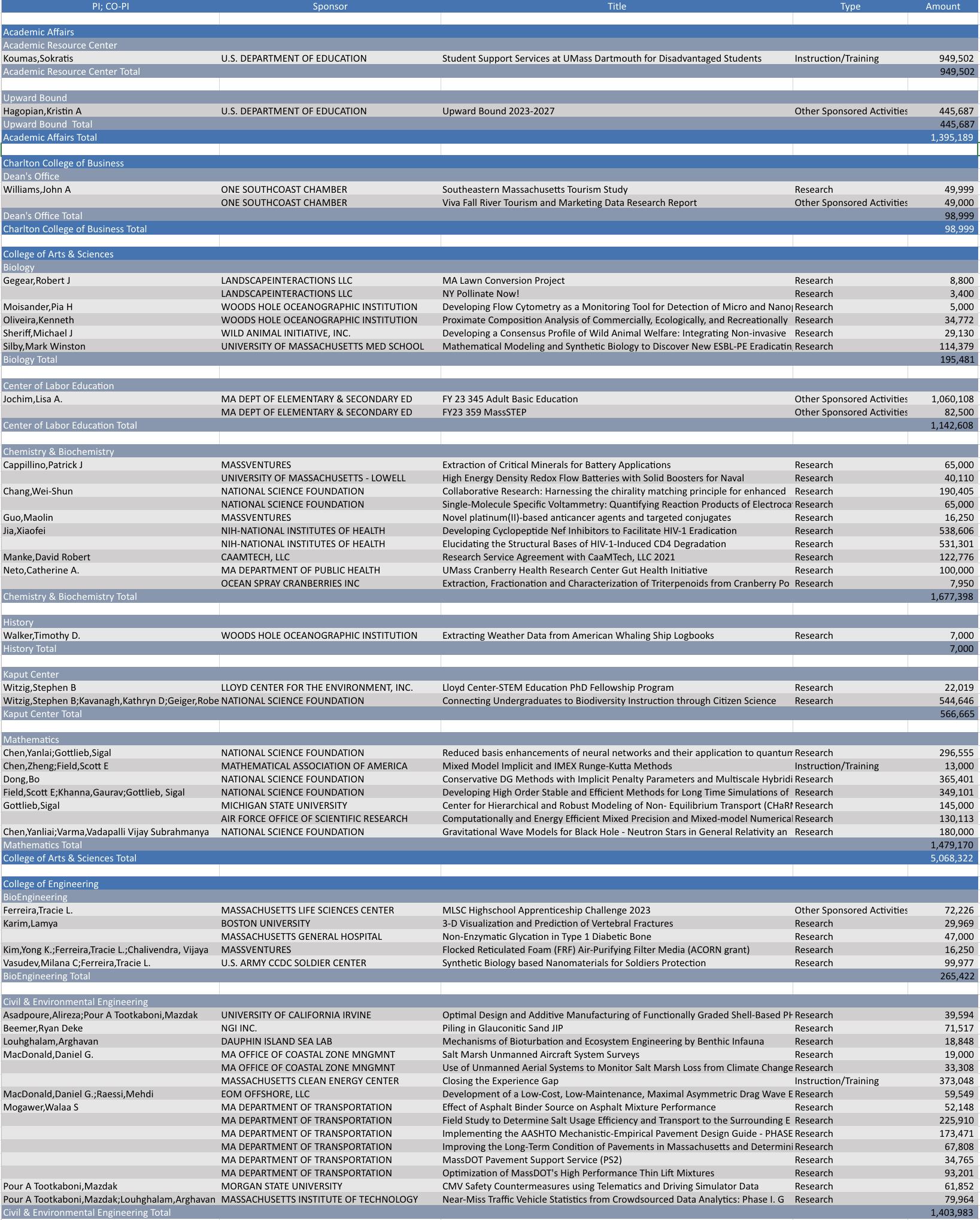
Metrics 2023 Annual Research Report 43
Awards by College FY 2023
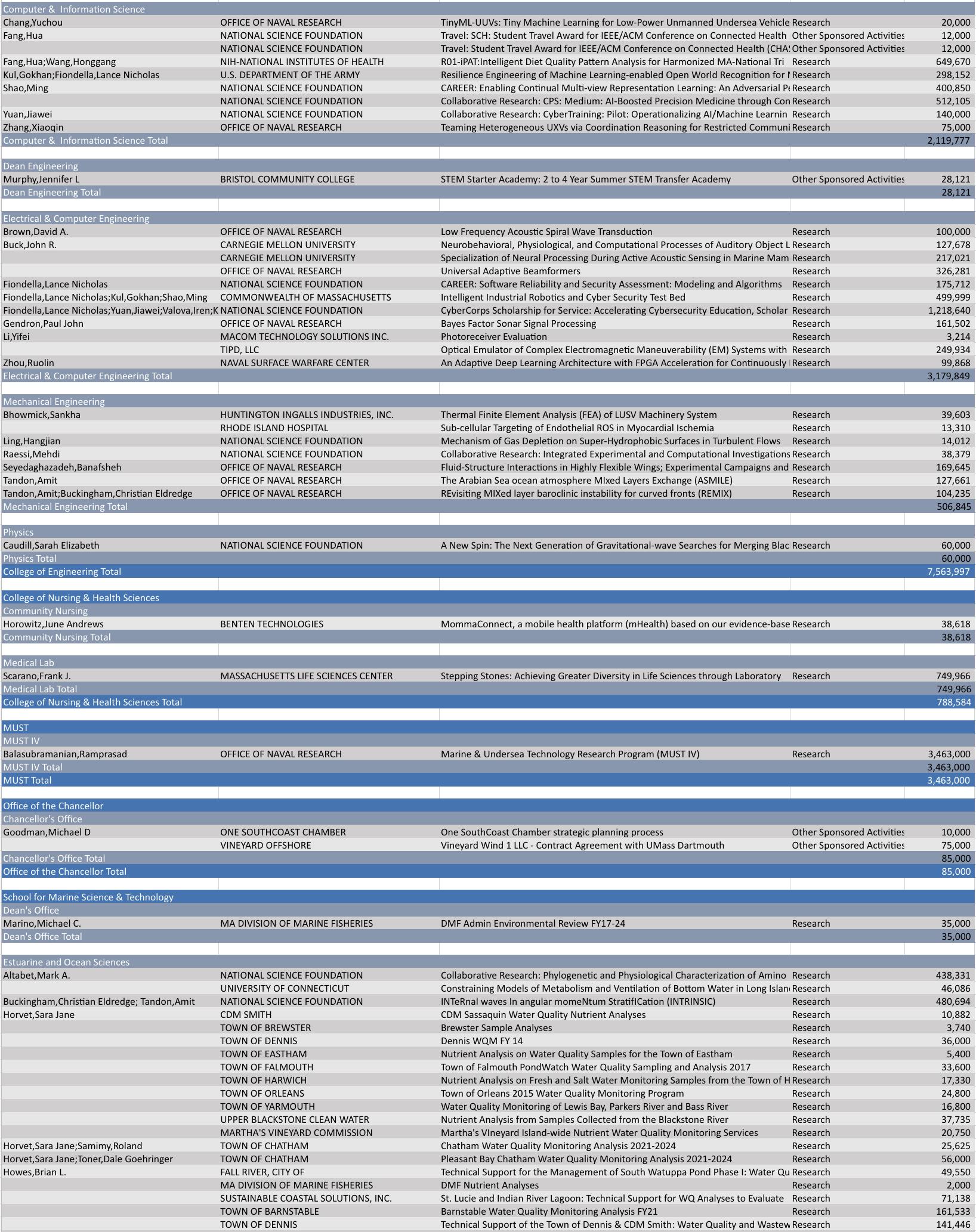
Metrics 44 UMass Dartmouth
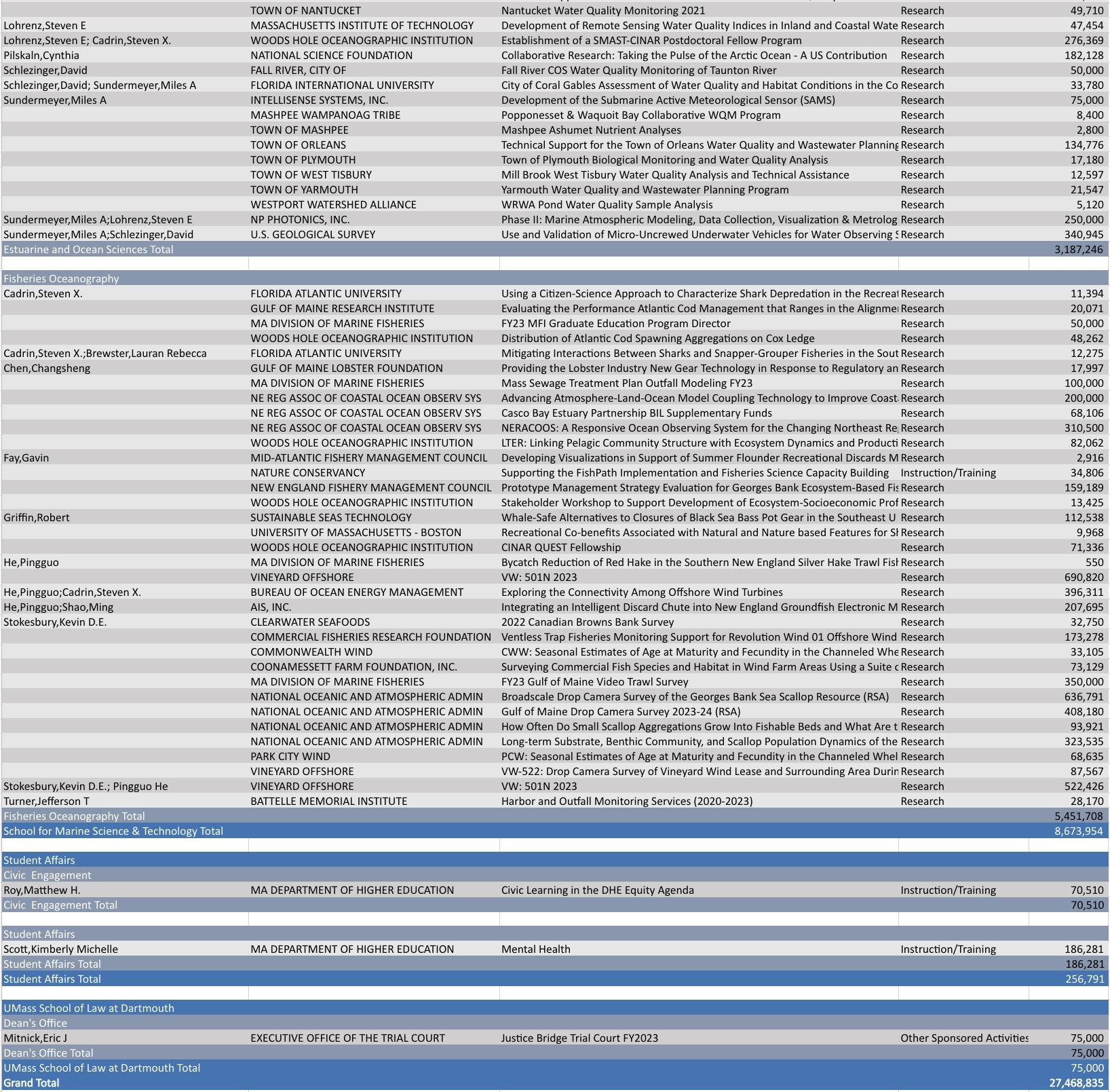
Metrics 2023 Annual Research Report 45
Extraordinary is what we do.

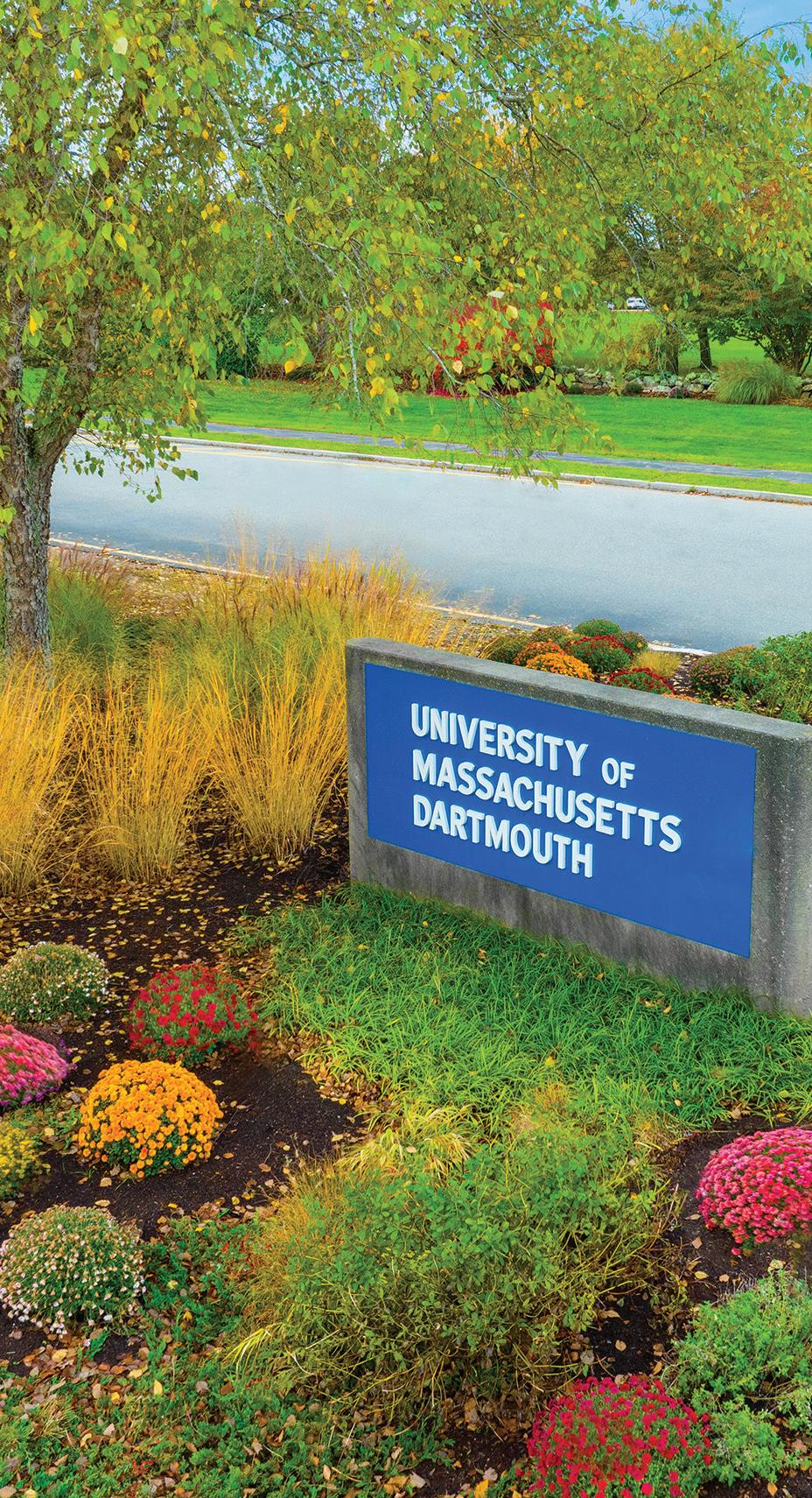
University of Massachusetts Dartmouth 285 Old Westport Road, Dartmouth, MA 02747 202310296-UMassD-AnnualResearchReport-BRO-KD
Westport
Non Profit Org. US Postage Paid New Bedford, MA Permit #149
285 Old
Road, Dartmouth, MA 02747



 Ramprasad Balasubramanian, PhD Provost and Vice Chancellor for Academic Affairs
Ramprasad Balasubramanian, PhD Provost and Vice Chancellor for Academic Affairs


 Mark A. Fuller, PhD Chancellor
Mark A. Fuller, PhD Chancellor































































 Megan Hennessey-Greene Assistant Vice Chancellor for Research and Innovation
Megan Hennessey-Greene Assistant Vice Chancellor for Research and Innovation





























